BOUTIQUE ASSET MANAGERS
Words of advice and warning from some of SA’s leading specialist investment houses. Can bad news actually be good news?
Page 20 - 23
FINANCIAL FREEDOM
With April being Freedom Month, the importance of financial freedom is at the fore.
Are all your clients where they need to be when it comes to achieving this goal?
Page 24 - 2 6
BY SIOBHAN CASSIDY MoneyMarketing Contributor
The index harmonisation process that took place at the Johannesburg Stock Exchange (JSE) in March should draw a line under complexity that – to quote Michael Dodd, Senior Fund Analyst at Morningstar Investment Management – has meant the simple question “How did the South African equity market do last year?” has not had a straightforward answer for several years.
In addition to cutting through complexity, analysts say, the consolidation of the 'vanilla’ and ‘Swix’ indices into one set of benchmark indices will be good news for liquidity on the JSE. It’s hoped that it will also lead to cost savings for investors over time.
A widely accepted index is a sign of a healthy market. Not only does it allow investors access to index-tracking products that allow broad market exposure, but active investment managers also use an index as a benchmark
2002
The FTSE/JSE All Africa Index Series was introduced as a replacement to the existing JSE Actuaries Indices of the time, heralding the start of the South African index partnership between FTSE Russell and the JSE. It introduced several modernisation elements to the indices, such as free float weighting, hierarchical sector classification and enhanced data.
against which performance can be measured.
An index should be widely accepted, investable and representative of the opportunity set. In pursuit of these objectives, various competing and overlapping indices have been developed for the JSE over the years. The landscape has become muddled, even as the Capped Swix All-Share Index has become the de facto headline index for the JSE.
The vanilla indexes include the FTSE/JSE All Share Index (ALSI), FTSE/JSE Top 40 Index, as well as various industry, sector, total return, and capped variants. Each of these indices has a corresponding Swix (shareholder weighted) variant, such as the FTSE/JSE Swix All Share Index and the FTSE/JSE Swix 40 Index. There are capped versions (maximum exposure to one share), too, making for a very confusing benchmarking system.
2004
FTSE/JSE launched the Capped All Share Index and the Shareholder Weighted (Swix) All Share Index. The two new approaches were cocreated with market participants to provide performance benchmarks that were better immunised from concentration risk.
Harmonisation
“is a really good thing”, says Kelin Pottier, Solutions Strategist at 10X Investments. “Before now, every investor had to choose their benchmark from this whole skittle-box of SA equity benchmarks. You could go All-Share, you could go Swix, you could go Capped Swix, Capped All-Share. You could go Top 40, Swix Top 40, Capped Swix Top 40.” He adds, “There was never a neutral representation of the local market. It also created enormous complexity in trying to assess and compare the performance of different asset managers who all use different benchmarks.”

Continued on next page
2016
FTSE/JSE launched the Capped Swix All Share Index triggered directly by requests from the South African fund manager and asset consultant community, who were concerned with the increasing concentration exposure to Naspers in the Swix All Share Index.


www.moneymarketing.co.za @MMMagza @MoneyMarketingSA First for the professional personal financial adviser INSIDE YOUR APRIL ISSUE 30 April 2024 The value of investments may go up as well as down, and past performance is not necessarily a guide to future performance. There are risks involved in buying or selling a financial product.For any additional information such as fund prices, fees, brochures, minimum disclosure documents and application forms please go to www.lauriumcapital.com Laurium Capital (Pty) Ltd is an authorised financial services provider (FSP 34142). www.lauriumcapital.com Shift the way you think about investing and consider Laurium Capital to diversify your investment portfolio. Our nimbleness as a boutique asset manager and di erentiated investment approach allows us to capitalize on a broad range of opportunities. Funds
across all major platforms. SHIFT YOUR PERSPECTIVE Investing for your future C M Y CM MY CY CMY K MoneyMarket_Nov 2023.pdf 1 2023/12/04 15:48:24 Benefits expected for managers and investors as JSE index harmonisation
ALL THE AWARD WINNERS
available
starts
We celebrate those who came out tops in the most recent industry awards. Page 11-17
1 CONTINUOUS PROFESSIONAL DEVELOPMENT




















Indexation: Anything but Passive.



Indices can be actively designed, like our Factor Range



Indices can be geographically diversified, like our Global ETF Range





Indices can be optimally designed like our Multi-Asset Range.
Indices can be designed to target themes, like our Thematic Range.










While indices can take many di erent forms, all are transparent and low-cost.

Take control of what you’re investing in by incorporating indexation into your portfolio. Contact us to learn more at institutional@satrix.co.za
















































Satrix Investments (Pty) Ltd is an approved financial service provider in terms of the Financial Advisory and Intermediary Services Act, No 37 of 2002 (“FAIS”). Satrix Managers (RF) (Pty) Ltd (Satrix) is a registered and approved Manager in Collective Investment Schemes in Securities.














Continued from page 1
Too many complications
The unique characteristics of the local market, including concentration risk resulting from the dominance of certain heavyweight companies, have prompted the evolution of diverse indices over the years.
According to the JSE: “The FTSE/JSE Africa Index Series is designed to be locally relevant for South African investors, and as such has some idiosyncrasies when compared to global benchmarks.”
The idiosyncrasy that March’s harmonisation talks to is the so-called Grandfathering clause. This special arrangement for certain dual-listed SA companies was agreed by the Reserve Bank during the apartheid era. It is now effectively done away with as the Swix and the vanilla indices have been collapsed into one.
As most South African investors know, National Treasury and the JSE classify companies as either local or foreign (also known as inward-listed) for exchange control purposes. That also determines whether local or global free float is used for the purposes of index placement. During the apartheid era, certain South African companies, under threat of sanctions, moved their primary listings abroad, mostly to London, and did inward listings to the JSE.
These homegrown companies tended to still have big operations in South Africa and local pension funds held a fair amount of their equity. There were concerns that if they were re-categorised as foreign, local pension funds would be forced to sell down their holdings to remain compliant with Regulation 28’s offshore limits. This would potentially prejudice investors and because the Reserve Bank feared a big flow of domestic assets offshore, these companies motivated to maintain their classification as local – the Grandfathering clause.
“Index harmonisation is important for several reasons, including the reduction of confusion among investors and making the comparability of domestic-only South African Equity fund performance more consistent”
Even though many of their shares were trading in other markets, the Grandfathered companies’ global free float of shares was used to determine their weight in the index. Investors couldn’t invest in those companies to the extent they are weighted in the index. “This is not an investable universe for those who were being judged against it,” says Pottier. “They were comparing fund managers who could invest only, say, 10% in one company against the benchmark, where 25% of the returns were driven by one company.”
Pottier adds, “Even if I bought the whole market, I would still not be buying as many shares in the company as I would need to hold to match the benchmark.” In response, the JSE launched the shareholder-weighted index (Swix), which weights the company according to the total number of shares available to trade on the local stock exchange. This is a fairer representation of the investable local universe and, as the JSE FAQ document explains, “over time, the Swix approach was adopted by institutional managers and investors as the local benchmark”.
When Naspers started its rise, the fund management
community became concerned with the increasing concentration exposure in the Swix All Share Index. At its peak, Naspers’ weight in the Swix reached roughly 25% of the index. Morningstar’s Dodd says, “The Swix generally worked as a suitable South African equity market benchmark, up until the meteoric rise of Naspers saw the concentration risk in the Swix increase.” At its peak, Naspers’ weight in the Swix reached roughly 25% of the index. In response, the JSE launched the Capped Swix, which restricts shares to a maximum weight of 10%, in 2016.
The Capped Swix became the preferred industry benchmark for the South African equity market, but its adoption has not been universal, with many managers still benchmarked to the ALSI and the Swix. “The different weighting and capping methodologies across these indices have resulted in some vastly different return outcomes,” he says.
Dodd says that index harmonisation is important for several reasons, including the reduction of confusion among investors and making the comparability of domestic-only South African Equity fund performance more consistent. Harmonisation should also result in a reduction in the number of index-tracking products being offered, which, Dodd adds, “provides the opportunity for product providers to improve economies of scale and potentially lower fees”.
Fixing the mismatch
Bradley Preston, Chief Investment Officer at Mergence Investment Managers, says one of the issues this harmonisation will fix is the mismatch that resulted as the majority of institutional fund managers used the Capped Swix and Swix indices as their benchmarks while the liquid derivatives markets in South Africa are based on the Top 40 Index. “This mismatch has meant that a large volume of derivatives have traded over the counter in South Africa and not on the exchange.” Preston sees the harmonisation potentially aligning these two markets so that the liquid equity benchmark and the liquid derivatives benchmark are the same, which “should be positive for JSE volumes and liquidity in the SA derivatives market”.
Abdul Basit Oldey, Head of Trading for Camissa Asset Management, agrees that index harmonisation should reduce market fragmentation and could improve liquidity. Also, he pointed to recent data published by Alexander Forbes, showing that nearly 90% of the assets under management included in their equity survey are already aligned to the Swix index variants, saying “this may be a reason for the upcoming harmonisation holding less weight among market headlines”.
Welcoming the change, Alexforbes Investments
Deputy Chief Investment Officer Senzo Langa, says, “The index harmonisation is positive, as the Swix free float methodology will now be applied to all the JSE counters, allowing for centralised liquidity, which is great for the market, especially for the passive and derivative market.”
He adds, “The biggest point of contention is that performance has favoured the old construct to a tune of 1-1.5% p.a. over the past 10 years when comparing ALSI versus Swix, which suggests a risk premia for companies with international exposure. We welcome the change, expect dispersion of returns in balanced managers, and some innovation on accessing ‘the lost’ rand hedge bias.”
However, industry sources says market participants have known about the changes for a while, and some have responded proactively by launching their own versions of indices that match the soon-to-be industry standard. Also, bearing in mind the harmonisation that has already taken place, not too much disruption is expected. Finally, Dodd’s question “How did the South African equity market do last year?” will have a straightforward answer.
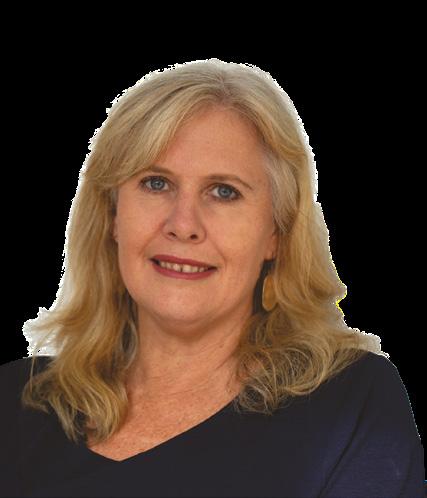
TEDITOR’S NOTE
he South African elections taking place on 29 May are going to be the hottest contested since the dawn of our democracy. With new players (including Jacob Zuma’s MK Party) entering the fray pollsters are having a difficult time predicting clear outcomes, although the consensus seems to be that the ANC is likely to lose its outright majority. In these uneasy, unpredictable times, we spoke to some industry players about their thoughts on what to expect when it comes to investing in these times. The good news, apparently, says Izak Odendaal, Chief Investment Strategist at Old Mutual Wealth, is that the market has already taken account of much of the insecurity, so it shouldn’t be too affected by the outcomes.
Diversification is still at the top of everyone’s list – noone wants too many eggs in one basket – but most interesting is that industry players predict there could be a positive upswing for local-facing equities and bonds. Providing nothing gets out of hand, of course, and elections are fair, above-board and peaceful.
It’s the US elections that seem to be causing more sleepless nights, with a Trump victory having a totally unpredictable effect on the world norm, affecting everything from security and long-forged alliances to market volatility and climate change. It’s causing investors to be hesitant, prudent and cautious, waiting it out to see what’s going to happen.
It’s Freedom Day on 27 April, which commemorates our very first democratic elections back in 1994. We’ve decided to focus on financial freedom in this issue, a very important part of any financial adviser’s role. Financial freedom offers your clients the autonomy to make choices without financial constraints and to pursue their passions. It alleviates stress, enhances their wellbeing and drives their personal growth. Ultimately, it empowers them to lead fulfilling and purposedriven lives. Take a closer look at our articles to garner any advice you can to give your clients pointers on achieving this elusive goal.
Happy reading!
SANDY WELCH Acting Editor, MoneyMarketing
Scan the QR code to subscribe to the MoneyMarketing newsletter







NEWS & OPINION 30 April 2024 www.moneymarketing.co.za 3
IMAGES Shutterstock .com
AMANDA DUSSE FRANCHISE PRINCIPAL, LIBERTY
How did you get involved in financial services –was it something you always wanted to do? It's quite an interesting career path for me to end up as a financial planner, as I did technical studies at school, from electronics, physics and technical drawing. I had different aspirations – I wanted to be a geographer. In 2016, I had a life-changing event where I lost my older brother. As a business owner, he had never had a conversation with a financial planner and had never been advised about the importance of estate planning, insurance and investments. He died intestate, leaving his family destitute. This sparked a desire to work in financial services to honour his memory and to help others avoid similar financial hardships. All this led to me pursuing a post-grad qualification in financial planning.
What was your first investment – and do you still have it?
My first encounter with an investment was through a savings account that my grandfather opened for me via Postbank. He saved that money in secret, and only disclosed on his deathbed that he had been saving money for me to become a lawyer. Unfortunately, the funds weren’t used for my studies; however, that thought and memory holds a very special place in my heart.
What have been your best –and worst – financial moments?

better, and cashed out my provident fund (R550K) to start a business that failed dismally. I lost all those retirement savings and I had to start from scratch and build a retirement plan that requires me to save a significant amount of money monthly for me to retire comfortably. To this day, the bulk of my investments go towards my retirement.
What are some of the biggest lessons you have learnt in and about the finance industry?
Both as a financial planner and a business owner I have learnt the importance of research and due diligence. Informed decision-making in finance requires thorough research and analysis. Whether it's evaluating investment opportunities, selecting financial products, or assessing market trends, conducting proper due diligence is crucial for success.
What makes a good investment in today’s economic environment?
My favourite investment vehicle is an endowment. A feature that I particularly enjoy is that during the minimum investment term of five years, clients are allowed one withdrawal and one loan, and given the current economic environment, it helps to be able to loan yourself money interest free, compared to a loan you’ll acquire at the bank with the current prime lending rate sitting at 11.75%. This investment vehicle also serves as a great tool to conduct proper estate planning and legacy creation as it allows one to nominate beneficiaries for inheritance. In addition, this solution allows you to invest 45% offshore, helping you to diversify your portfolio and expose your money to different economic environments. After five years, the endowment becomes an open-ended investment with easy access and investment.
My ultimate and best financial moment was in 2022 when I bought my mother a house without applying for a credit facility at the bank; I had saved enough money to buy the property in cash. I am still savouring this moment to this day. My worst financial moment was when I didn't know any 1
What finance/investment trends and macroeconomic realities are currently on your watchlist?
Currently Artificial Intelligence (AI), where Robo Advice is concerned, is high on my trends list. Last year, I was
“My ultimate and best financial moment was in 2022 when I bought my mother a house without applying for a credit facility at the bank”
Earn your CPD points
fortunate enough to win a Liberty-funded trip to attend a Dreamforce – Salesforce conference in San Francisco. It is one of the biggest tech conferences in the world. This conference was a once-in-a-lifetime experience, and a new world that I’d never been exposed to. A topic that piqued my interest was to understand how South Africans might adopt and implement Robo Advice. It made me think about my mom conversing with a Robot/AI tool, giving her advice on how to spend her last pay cheque.
My view on AI is that I do see it adding value with system optimisations and simplifying the service industry where everything is a click of a button, and solutions are provided. However, it will likely result in job losses. At the San Francisco airport while waiting for our flight, we saw a robot going about its business, cleaning, dusting and mopping surfaces. That had me thinking that AI is here, and I hope we are ready for it as South Africans. My experience at the Salesforce conference got me deeply invested in the evolution of AI.
What are some of the best books on finance/ investing that you’ve ever read — and why would you recommend them to others?
I have two favourites: Firstly, The Psychology of Money: Timeless Lessons on Wealth, Greed and Happiness by Morgan Housel. Housel shares 19 short stories exploring the strange ways people think about money and teaches you how to make better sense of one of life’s most important topics: money. He equips you with interesting ideas and practical takeaways to implement in your money management strategies. This book was gifted to me by my mentor when he realised I had made a successful career out of financial planning. He advised I should also do some introspection to understand my relationship with money. He further explained it will make me a better business owner and financial adviser. It focuses on personal psychology regarding money, and why people make certain financial decisions.
The second book I’d recommend is The Essentials of Personal Finance for Teens and Young Adults: Master Money Management, Gain Financial Literacy and Lay the Foundation for Success by DM Stevens. This book unpacks complex financial concepts in a simplified manner. It is written for young readers and would make a great gift for anyone at any age who needs to improve their financial literacy.
The FPI recognises the quality of the content of Money Marketing ’s April 2024 issue and would like to reward its professional members with 1 verifiable CPD points/hours for reading the publication and gaining knowledge on relevant topics. For more information, visit our website at www.moneymarketing.co.za

30 April 2024 NEWS & OPINION 4 www.moneymarketing.co.za IMAGES Shutterstock .com
CONTINUOUS PROFESSIONAL DEVELOPMENT

Access Bank’s new CEO
Access Bank South Africa has appointed Sandile Shabalala as Chief Executive Officer (CEO). Shabalala brings over three decades of extensive experience in the banking sector, and a proven track record of driving growth and managing risk. He previously served as Chief Executive for Business and Commercial Banking at Sasfin Bank Limited, where he led the establishment and development of the Business Banking division. His responsibilities there included building, enhancing and growing transactional banking and products, and achieving sustainable financial performance. He was also CEO of TymeBank, where he successfully led the bank’s launch and established it as a disruptive force in the South African banking industry. As Access Bank’s new CEO, Shabalala will leverage his expertise in strategic planning, risk management, and stakeholder engagement to propel the bank forwards.
NEW APPOINTMENTS

New CEO for Pernod Ricard
Pernod Ricard Africa has appointed Sola Oke as its new Managing Director for Africa. Oke’s selection follows a rigorous, transparent, and merit-based process aligning with Pernod Ricard’s commitment to upholding the highest organisational standards in recruitment.
Oke brings extensive experience to his new role. With over a decade of tenure within the Pernod Ricard family, Oke’s journey commenced in 2014 as Marketing Director in Nigeria. His strategic insight and leadership have played a pivotal role in driving the company’s growth across the African region, in multiple roles, but most recently as the Managing Director for Pernod Ricard Nigeria and Western Africa. He holds
Un-natural advantage
BY AADIL OMAR Head of Equity Research at M&G Investments
Michael Phelps was built to swim fast. Based on nothing more than his physical attributes and his 23 gold Olympic medals, I would not be remiss in suggesting he was born with a natural advantage.
This sort of anatomical advantage is not unusual to observe in the domain of elite physical performance. A simple internet search will reveal all sorts of biometric data on elite athletes, from which one can easily connect the dots to outstanding performance. But the further from physical competition one veers, the less apparent these explicit advantages, and the trickier it becomes to rely on deductive reasoning to predict performance.
Take chess champions, for instance. If you asked me what makes Gary Kasparov or Magnus Carlson the best chess players to have competed in the game, I’m not sure I could answer that question by succinctly identifying an explicit advantage.
We can appreciate that the more complex and multi-faceted the game, the more difficult it becomes to articulate the advantage. Both games, however, occur in a relatively static environment where outside
variables or shocks play no role whatsoever, i.e. there is no random variable. Competitors know exactly what is required to win and what variables are at play at any moment. Trying to determine the explicit advantage in a real-world setting where random variables are present gets even trickier.
Non-explicit
I’ve always found the intuition around an advantage or ‘edge’ in investing tricky. Any advantage a money manager might possess will not be explicit the way a Phelps advantage is. Competitive advantages in the money management industry tend to be rather opaque. Observations are tricky and description almost always must be analogous if not conceptual. A basic internet search seeking the sources of an edge in investing revolves around ideas such as discipline, patience, risk tolerance, analytical rigour and other generalisations. Very rarely can you find an explanation detailing an explicit advantage – unless it is in some way related to the possession of material non-public information1. This is not to say that advantages in money management do
a master’s degree from the University of Manchester and Cardiff Business School.
Promotions at Compli-Serve SA
Compliance and professional services firm to financial services companies Compli-Serve SA has made two new promotions of staff. Tanya van Aswegen, who marks 20 years working at the firm this year, is promoted to Chief Operating Officer, while Kelly Matthews, who has worked for the company for over five years, is promoted to Senior Bookkeeper. They both began their careers at Compli-Serve as receptionists assisting the broader team, and have worked their way up in various roles over time.
“Our Director saw the potential in me and encouraged me to invest in my education and to stay with Compli-Serve, to establish policies, procedures and processes for our head office, most of which are still in use to date,” says Van Aswegen, who has studied Business Management and is nearing completion of a Bachelor of Commerce degree, evolving from a receptionist/PA to Office Manager, General Manager and now into her new role as COO. Richard Rattue, Managing Director and Founder of Compli-Serve, has praised the invaluable work these women do at Compli-Serve SA. “Tanya and Kelly have grown tremendously over the years and have shown true passion
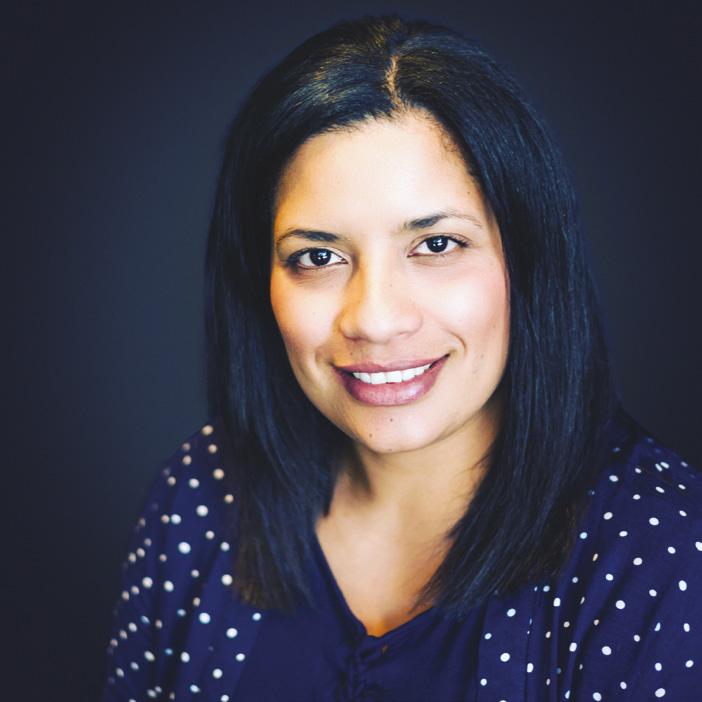

for compliance and the work they do. They are positive, proactive and indispensable members of our team and we wish them all the best in their new roles.”
not exist, but rather that any advantage is unlikely to be explicit in nature.
As much ‘what’ as ‘how’ we play
Unlike professional swimmers and chess players, investors have much greater degrees of freedom. Within the confines of a mandate, an investor can dial up risk or step back based on market dynamics. This means an investor can narrow the ‘field’ to the point where an advantage is more likely. In contrast with Kasparov, who cannot simply eliminate the rooks from the chess board just because he happens to prefer bishops, an investor can opt into the sort of investments they believe offer the best prospects. It’s not uncommon for investors to be labelled along the lines of their preferred ‘playbook’, such as value investor or activist trader. These diminutive labels are not that descriptive in detailing the source of an edge, but closer scrutiny of an investment philosophy and the process can be illuminating. Warren Buffet famously pointed to three key elements that he attributes his investment success to: 1) stay within your circle of competence; 2) invest with a margin of safety; and

3) invest in companies that have a sustainable competitive advantage and are managed by capable stewards of capital. At M&G, we have similarly been focussed on a few key tenets to inform our investment decisions:
1. Focus on long-run anchors of value
2. Minimise the short-term noise
3. Construct portfolios in a risk-conscious manner.
I maintain that explicit advantages are not apparent in the money management industry, but looking back, it appears that an emergent edge may well be prevalent among certain managers. As in any game, a demonstrable and consistent track record is the closest thing we have to proof of an edge.
1 For an example of these explicit advantages
NEWS & OPINION 30 April 2024 www.moneymarketing.co.za 5 SANDILE SHABALALA
SOLA OKE
TANYA VAN ASWEGEN
KELLY MATTHEWS
read
Flash Boys
the book
by Michael Lewis
Satrix shares its 2024 top investment trends
BY KINGSLEY WILLIAMS Chief Investment Officer at Satrix
From strong global growth in indexation, FTSE/JSE index harmonisation to new opportunities for offshore exposure, Satrix recently shared its top investment trends for 2024.
Kingsley Williams, Chief Investment Officer at Satrix*, says despite a volatile 2023 market, Satrix saw considerable business growth. “Our business crossed the R200bn in AUM mark (as at 31 December 2023) despite a very challenging environment and we are grateful to all our clients for their support. We had a busy year onboarding the NewFunds ETFs from Absa that expanded our ETF product range, and we're looking forward to exciting product developments this year ”
Satrix’s Top Trends for 2024:
1. Indexation trends and the shift towards indexed strategies: The shift towards indexed strategies continues to gain momentum globally. As of the end of 2022, 33% of global assets were managed according to an indexed
approach, up from 14% in 2011. In the US, indexed assets now surpass the 50% mark across all asset classes, not just equities. In Europe, indexed funds represent 27% of total AUM, while actively managed funds have seen a decline in AUM. Nico Katzke, Head of Portfolio Solutions at Satrix, says that South Africa is still lagging Europe, but it’s experiencing strong indexation growth, with almost 14% of South African listed equity and property funds now indexed across the collective investment scheme market.
2. ALSI/SWIX harmonisation’s impact on investors: Williams says the March 2024 rebalancing set to align the All Share (ALSI), Capped All Share, and various subsets like the Top 40 with the Shareholder Weighted Index (SWIX) approach will down-weight the remaining grandfathered companies –Anglo American, Mondi, and Investec PLC – in the ALSI-methodology indices. There will be approrate upweight of the
remaining companies. This strategic move, termed 'index harmonisation', aims to eliminate the discrepancies between the ALSI and SWIX indices. Eventually, as the indices fully adopt the SWIX structure, the SWIX indices will be phased out. Williams adds that grandfathered companies have historically undergone organic down-weighting in the ALSI indices as they restructured and lost their grandfathered status. “A comparison of stock and sector weights between December 2021 and December 2023 reveals a significant reduction in the weight of grandfathered and duallisted companies – from 37% to 17% and 46% to 27%, respectively. Companies like Richemont and BHP Group have seen substantial weight reductions following business restructurings during this period, while other shares have increased in weight.” He notes that the transition to a unified benchmark approach is a logical step that reflects the evolving market dynamics and the

need for a unified benchmark for broad market indices.
3. Increased opportunity for offshore exposure: Williams says Satrix is excited about the March listing of the Satrix JSE Global Equity ETF (STXJGE), tracking the FTSE/JSE Global Investor Index. This ETF will offer investors increased exposure to offshore earnings and rand hedge stocks. In addition, the February listing of the Satrix MSCI ACWI ETF (STXACW) tracking the MSCI All Country World Index, offers another building block in an investor’s overall asset allocation, with exposure to countries like China and India in addition to developed markets.
Williams says that as Satrix navigates the evolving investment landscape, its focus remains on delivering innovative solutions that meet the diverse needs of its clients.
*Satrix is a division of Sanlam Investment Management and an approved financial service provider in terms of the Financial Advisory and Intermediary Services Act, No 37 of 2002 (“FAIS”).
Solar gets smarter and more powerful
While South Africans suffer under the relentless pressure of loadshedding and infrastructure limitations, it’s also provided an opportunity for international companies to expand and develop solutions to address the issues we face. One of these is a new three-phase hybrid inverter from Sungrow, a global PV inverter and energy storage system supplier. According to Ezzat Sankari, Channels Business Director for Sungrow Middle East and Africa at Sungrow, South Africa’s real need is for low commercial and industrial applications, and to meet these needs, a three-phase hybrid inverter is required. The three-phase hybrid inverter is available at 15kW, 20kW and 25kW capacity.
These inverters can be paired with Sungrow’s 9.5kWh or 25.6kWh lithium ferro phosphate batteries to create a hybrid solar + storage system. The three-phase design provides more power for energy-intensive appliances and equipment in large homes or smallto-medium businesses. They are also engineered to thrive in South Africa’s diverse weather conditions.
“Our commitment to efficiency, reliability, and user-friendliness ensures that our inverter empowers consumers with newfound control over their energy usage,” says Sankari.
Sungrow’s 3-phase product offers a range of benefits tailored to the South African market:
• More powerful: The SH15-25T with
SBR is a highly powerful solution that can start and run more appliances like heating, ventilation and air-conditioning units, pool pumps, and more during a grid outage.
• More independence: Standalone supply capability, regardless of external network conditions, offers true independence from grid constraints.
• Increased efficiency: Three MPPTs for different orientations operate between 150-950V, optimising roof space and extending working hours. All panel compatibility ensures maximum energy utilisation.
• Better safety: With reliable safety measures,
AFCI 200ms shutdown on system errors with a maximum 200 metres for system safety. NRS and IEC certifications certified by TUV and SGS ensure compliance and reliability.
• Advanced technology: The iSolar cloud app optimises solar energy usage and increases consumption transparency, providing 10 sec data refresh rates on power consumption.
• Improved flexibility: Flexible combination of battery and inverters and easy system expansion at any time.
To date, the Chinese company has installed over 405 GW inverters and converters in over 150 countries worldwide. Sungrow has a state-level post-doctoral research workstation and a national high-tech industrialisation demonstration base. It also boasts an enterprise technology centre, industrial design centre and green factory. While Sankari says there are no plans to enter into or tender for any government or other major partnerships at present, in recent weeks the company did sign a strategic supply agreement with Gulf Energy Development in Thailand. (Gulf is one of Thailand’s biggest independent power producers.) Gulf said that equipment purchased through the Master Supply Agreement (MSA) will be used at a combination of ground-mount solar PV plant, solar-plus-storage hybrids and rooftop PV projects in Thailand.

30 April 2024 6 www.moneymarketing.co.za NEWS & OPINION
IMAGES Shutterstock .com

AIEmbracing AI in your financial planning business
BY FRANCOIS DU TOIT, CFP® PROpulsion
is turning everything on its head, including the financial services industry, and you need to be ready for it. Whether you are a financial adviser, a financial planner, a business owner, or a stakeholder, you need to adopt a mindset that welcomes AI as an opportunity, not a threat. In this article, I will explain the difference between everyday AI and game-changing AI, and why you need to develop your AI communication skills – especially prompt engineering – to succeed in the AI era.
It starts with mindset
The right mindset is crucial for learning and adopting new technologies such as AI. The story we tell ourselves about our abilities and potential can either limit or expand our opportunities. Your mindset influences how you approach new challenges, how you cope with setbacks, and how you grow from feedback. By having a growth mindset, you can embrace AI as a tool for learning and improvement. By having an abundance mindset, you can leverage AI as a source of innovation and value creation. By having a gratitude mindset, you can appreciate AI as a gift of human ingenuity and collaboration. Mindset is the foundation of your learning and growth.
Everyday AI vs Game-changing AI
AI is not a single idea, but a range of technologies that can do activities that usually need human intelligence. Some AI applications are already part of our everyday lives, such as voice assistants, chatbots, facial recognition, and recommendation systems. These are examples of everyday AI, which are designed to augment human capabilities and make our lives easier. Everyday AI is often narrow in scope, focused on specific tasks, and limited by data and rules.
However, there is another type of AI that is more disruptive and transformative, and that is game-changing AI. Game-changing AI is the kind of AI that can create new value, generate new insights, and solve complex problems. Game-changing AI is often general in scope, adaptable to different domains, and capable of learning from data and feedback. Game-changing AI is the kind of AI that can challenge the status quo, create new markets, and redefine the rules of the game.
As a financial professional, you need to be aware of both types of AI, and how they can impact your business and your clients. Everyday AI can help you automate routine tasks, improve efficiency, and enhance customer experience. Game-changing AI can help you discover new opportunities, create new products and services, and differentiate yourself from the competition. You need to embrace both types of AI and leverage them to your advantage.

The importance of AI communication skills
One of the most important skills that you need to develop in the AI era is AI communication skills. AI communication skills are the skills that enable you to interact with AI systems effectively and efficiently. AI communication skills include understanding how AI works, what it can and cannot do, and how to provide feedback and guidance to improve its performance. AI communication skills also include knowing how to communicate the value and limitations of AI to your clients, and how to address their concerns and expectations.
One of the most critical AI communication skills you need to master is prompt engineering. Prompt engineering is the art and science of designing prompts
“By having an abundance mindset, you can leverage AI as a source of innovation and value creation”
that elicit the desired response from an AI system. A prompt is a question, a command, or a statement that you use to communicate with an AI system. Prompt engineering is essential because the quality of the prompt determines the quality of the output. A welldesigned prompt can help you get accurate, relevant and useful information from an AI system. A poorly designed prompt can lead to confusion, errors and frustration.
Prompt engineering is not only a technical skill, but also a creative and strategic one. You need to understand the context, the goal and the audience of your prompt. You need to use clear, concise and specific language. You need to avoid ambiguity, bias and assumptions. You need to test and refine your prompt until you get the optimal result. Prompt engineering is a skill that you can learn and improve with practice and feedback. And best of all, it transcends tools. Once you acquire the skill, you can use it with any AI tool.
AI is here to stay, and you need to be prepared for it. As a financial professional, you need to adopt a mindset that embraces AI as an opportunity, not a threat. You need to understand the difference between everyday AI and game-changing AI, and how they can benefit your business and your clients. You need to develop your AI communication skills, especially prompt engineering, to interact with AI systems effectively and efficiently. By doing so, you will be able to leverage AI to your advantage and stay ahead of the curve in the financial services industry.
Stay curious!

NEWS & OPINION 30 April 2024 www.moneymarketing.co.za
Francois du Toit founded PROpulsion, a thriving community for financial planners and advisers focused on helping them belong, grow and thrive. He hosts the PROpulsion LIVE podcast (every Friday at 8am live on YouTube) with more than 249 episodes and counting, sharing his 2.5 decades of experience and engaging with local and international guests to inspire and inform. Committed to learning and utilising new technology, he is on a mission to change lives at scale. Visit www. propulsion.co.za for more information.
IMAGES Shutterstock .com
Is your finely crafted financial plan a grand masterpiece?
Or will it be let down by traditional life insurance products that don’t match your clients’ needs?

As a highly skilled financial adviser, you know that every financial plan is carefully designed to meet your client’s needs today, and as their life changes. BrightRock’s needs-matched life insurance lets you create a product solution that precisely matches the financial plan you’ve crafted for your client.
For example, we can offer your qualifying clients two benefits in one, thanks to our cover conversion facility. They’ll be able to increase one benefit and reduce another as their needs change.
So, later in life, they could use their disability premiums to buy more cover for another need – without medical underwriting, even if their health has changed*.
Only with needs-matched life insurance do you have unrivalled flexibility and efficiency, so that your finely crafted financial plan becomes an enduring masterpiece in your client’s hands.
Get the first ever needs-matched life insurance that changes as your life changes.


















*Terms and conditions apply BrightRock Life Ltd is a licensed financial services provider and life insurer. Company registration no: 1996/014618/06, FSP 11643. Terms and conditions apply.
The FSCA is watching
BY JAMES GEORGE Compliance Manager at Compli-Serve SA
The financial services industry is experiencing action against non-compliance by the Financial Sector Conduct Authority (FSCA). Examples include administrative sanctions of R400 000 on Theuns Vosloo Financial Advisory Services CC (TVFAS) and a sizeable R16m against Ashburton Fund Managers (Pty) Ltd (AFM), a subsidiary of FirstRand Limited – both for non-compliance with the Financial Intelligence Centre Act (FIC Act). As licenced Financial Services Providers and accountable institutions under the FIC Act, both firms are required to adhere to regulations aimed at combating money laundering, terrorism financing, and related criminal activities.
Reflecting on why these penalties have come to pass highlights the FSCA’s commitment to enforcing compliance with the FIC Act and its broader objective of safeguarding the integrity and security of South Africa’s financial system.
TVFAS underwent an inspection by the FSCA in January 2024 while AFM did so in late 2022. These inspections revealed significant shortcomings in implementing their respective Risk Management and Compliance Programmes (RMCP), which, while developed, weren’t being used and were deficient in detailing compliance with the FIC Act.
The firms’ negligence in establishing and verifying the identities of clients as mandated by the FIC Act were top issues. This process, a cornerstone of anti-money
laundering and counter-terrorism financing measures, has left operations vulnerable to misuse by potentially illicit actors.
Neither conducted the necessary screenings of clients against the Targeted Financial Sanctions Lists (TFSL) issued by the United Nations Security Council, as required by sections 28A in conjunction with sections 26A to 26C of the FIC Act. This oversight meant that clients might be listed under the Protection of Constitutional Democracy Against Terrorist and Related Activities Act, No. 33 of 2004 (POCDATARA), but were not reported and those listed did not have their assets frozen, as is legally required. AFM also failed to outline processes for examining complex transactions, performing due diligence, terminating business relationships and determining reportable activities.
The FSCA chose to suspend half of the imposed penalty on TVFAS, R200 000, for a period of three years on the condition that it rectifies the identified deficiencies and maintains full compliance with the critical sections of the FIC Act. It’s good to note that remediation of deficiencies is viewed favourably by regulators. This paused penalty takes away some pressure but remains a costly burden, including on TVFAS’ reputation.
These penalties underscore the necessity for all accountable institutions to implement robust anti-money laundering and counterterrorism financing measures,

including effective risk management, client due diligence, and regular screening against sanction lists. Non-compliance with regulatory requirements will be met with stringent regulatory action to protect the financial system and its participants from criminal exploitation.
The cases are an important reminder to not only develop but also effectively implement a comprehensive RMCP that should clearly outline the procedures and processes to mitigate money laundering and terrorist financing risks, as well as ensure compliance with the FIC Act.
Financial institutions must establish and rigorously implement processes to accurately identify and verify clients at the outset of establishing a business relationship or when conducting transactions.
Proactive engagement and transparency with the FSCA or other regulatory bodies demonstrates commitment to upholding integrity. Regulatory compliance should be viewed as an integral part of any firm’s strategic operations, not just a legal obligation.
Ensuring compliance with the FIC Act and other regulatory standards is a clear way forward as it helps protect against reputational damage, financial penalties, and operational risks.
Your clients should be able to claim on multiple benefits for the same condition
 BY CLYDE PARSONS Chief Innovation Officer, BrightRock
BY CLYDE PARSONS Chief Innovation Officer, BrightRock
Getting your clients insurance that can precisely match their needs is vital. This ensures that the client can be fully protected when they claim. A comprehensive life insurance policy will include temporary disability, permanent disability, critical illness, and death cover. As these benefits cover different needs, it’s essential to ensure that your clients not only have cover that matches their needs, but cover that they can receive multiple claims for.
At BrightRock, we’re committed to ensuring that clients structure their cover correctly. Our needs-matched product structure enables advisers and their clients to see the cover they need by linking the different insurable events –temporary illness or injury, permanent illness or injury, and death – to the specific financial needs that may arise in each event. Our clients have benefited
from this needs-matched structure and market-leading claims criteria.
One such client was a 64-year-old medical doctor who needed triple bypass surgery. The doctor benefited from unique features, ensuring a higher pay-out and greater claims stage flexibility compared to what he would have received with other providers. The bypass surgery met our clinical criteria for both his temporary disability and additional expense needs cover, or as it is more commonly called in the industry, critical illness cover. We paid a total of more than R3m across these two benefits, resulting in a more comprehensive pay-out that met both his income and asset protection needs.
While the client was booked off for 10 days by his doctor, which met our sickness criteria, we extended his temporary expenses pay-out to a guaranteed four months because his condition met a clinical definition, applying the longer of the two durations. What’s more, BrightRock doesn’t aggregate pay-outs against
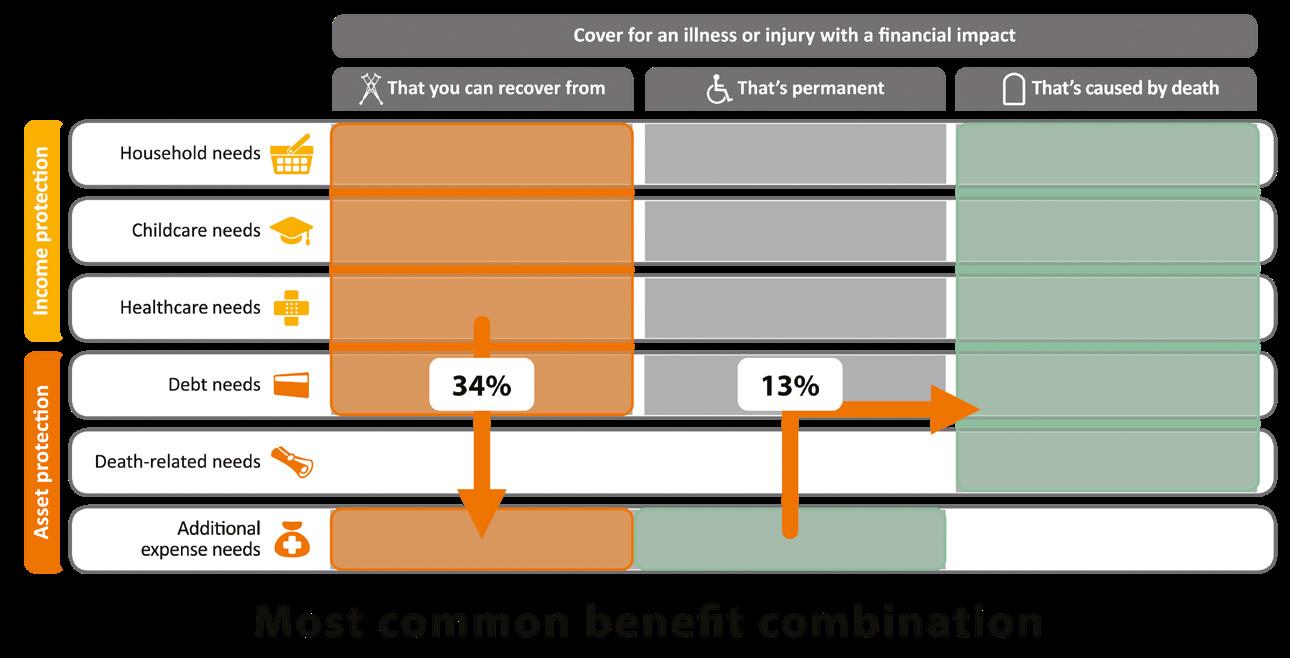
active income, offering the full cover amount even if the client resumed earning an income after the period they were booked off for.
Claims statistics for multiple claims
When clients file a claim, we find that they often qualify for pay-outs on different benefits. In fact, our approach is to proactively look across all the client’s benefits to see if they qualify for a pay-out. With us, they only have to complete one form, and we’ll then assess the claim to see if it meets criteria across different benefits.
The most common claim benefit combinations are temporary expenses cover and additional expense needs or critical illness cover, which make up 34% of the multiple claims BrightRock has paid to date. Equally impactful are combinations involving death cover and additional expense needs, constituting 13% of the multiple claims we’ve paid. This emphasises the importance for your clients to have standalone additional expense needs cover that doesn’t accelerate other benefits, ensuring a robust safety net for our clients on their death.
30 April 2024 www.moneymarketing.co.za 9 NEWS & OPINION
Decoding COFI: Giving teeth to TCF
The Conduct of Financial Institutions (COFI) Bill, currently in its second draft, is set to significantly transform the regulatory landscape of the financial industry, and one key area of focus is its impact on the Treating Customers Fairly (TCF) Outcomes. While the bill hasn’t been finalised yet, its approach to TCF is unlikely to change. This allows financial service providers (FSPs) to prepare proactively for COFI implementation.
Presently, various regulations cover TCF principles to different degrees, with some, like the Policyholder Protection Rules (PPRs) for insurers, incorporating more comprehensive requirements than others. This variance results in gaps and differing interpretations of these principles for various role players.
COFI seeks to address this by making TCF principles a universally understood set of requirements to deliver fair outcomes that are consistently implemented and enforceable on all financial institutions.
Giving teeth to TCF
How will COFI strengthen TCF compared to current legislation?
It’s in the detail: COFI provides a more comprehensive breakdown of the TCF Outcomes. While not explicitly listed from one to six, specific sections in COFI delve into the outcomes in more detail.
For instance, TCF Outcome 1 requires customers to feel confident they are dealing with an institution that puts TCF at the core of its culture. This is addressed directly in Section 17 of COFI, which deals with principles relating to culture and governance. It states that financial institutions should promote
 BY ANRI DIPPENAAR Masthead Head of Compliance
BY ANRI DIPPENAAR Masthead Head of Compliance
 SHANAL BOODIRAM Masthead Compliance Manager
SHANAL BOODIRAM Masthead Compliance Manager
a corporate culture and conduct their business in a manner that promotes the fair treatment of customers.
Another example is Chapter 6: Advertising and Disclosure. This tackles Outcome 2, emphasising the need for selling and marketing financial products based on customer needs.
Unified legislation: The current scattered nature of the TCF Outcomes can leave financial institutions and their customers confused. For example, an insurer is categorised as a product provider but is also licenced as an FSP. This means they must comply with comprehensive TCF requirements outlined in the PPRs, governed by the Long-Term and Short-Term Insurance Acts, and the less detailed and scattered requirements in terms of the FAIS Act regulations. This allows for differing applications. COFI’s purpose is to eliminate this confusion by establishing a singular application and interpretation of TCF across all financial institutions, based on the services they offer rather than their institutional classification.
Evidencing outcomes with data: The Omni-Conduct of Business Returns (CBR) is where COFI really flexes its
 LISA TEIXEIRA Masthead Compliance Specialist
LISA TEIXEIRA Masthead Compliance Specialist
TCF muscles. Under the new legislative framework, financial institutions must follow the rules, but there will be a bigger focus on evidencing TCF through customer outcomes.
Financial institutions must report on various conduct indicators – for instance, the business composition, i.e. the number of transactions, type of transactions and client base; reporting on complaints handling and claims management; policy cancellations; etc. – in their Omni-CBR reports.
Financial institutions will have to prove customer outcomes with data. For example, according to TCF Outcome 3, customers must be given clear information and kept appropriately informed before, during and after they sign on the dotted line. Say an FSP meets all its compliance obligations in terms of client communication, but a significant number of its customers complain they weren’t informed of changes to their policies. Even though the FSP followed the rules, the data shows there’s an issue with the way it communicates, and to treat its customers fairly, it needs to address this problem.
Another example: if your Omni-CBR report shows you have a higher-thannormal cancellation rate for a long-term insurance product, there could be an issue. You’ll need to do a root cause analysis to find the crux of the problem and take remedial action. However, if your cancellation rate is within the acceptable range, it suggests the product meets the clients’ needs and you’re treating your customers fairly.

focuses on TCF outcomes and considers the nature of the business, and while there will still be rules governing financial institutions’ actions, the shift allows institutions to demonstrate positive client outcomes rather than just ticking off a list of compliance items, providing more flexibility.
Secondly, COFI provides a more detailed description of the principles and standards that underpin the various TCF Outcomes. Unlike current legislation, financial institutions will have a singular legislative reference for a clearer understanding of the TCF Outcomes and the criteria against which customer outcomes will be assessed. Regardless of whether one is a product provider, FSP, a credit provider, a bank or any combination of these, the uniform application of TCF principles for similar activities ensures consistency across the industry.
Thirdly, incorporating client outcome measurements is a sound business practice. It allows organisations to pinpoint areas of concern, identify root causes and implement remedial action. This results in heightened customer satisfaction and increased client retention.
Preparing for the future
If you run a clean business that operates smoothly and treats clients fairly, you are already well prepared. However, a potential challenge for many FSPs lies in their ability to record the necessary Omni-CBR data and to use and translate this data into evidence that demonstrates the FSP’s commitment towards TCF Outcomes. FSPs need to review their current data-gathering systems to determine whether they can report on and then measure client outcomes.
Benefits of a more robust TCF framework
Requiring financial institutions to illustrate client outcomes with data encourages genuine prioritisation of TCF, and this will significantly benefit consumers.
However, financial institutions can use it to their advantage. Firstly, it can save on operating costs. COFI
Each FSP should have a system –whether a simple Excel sheet, a more complex version or an advanced customer management system – that facilitates the collection, organisation and storage of data, enabling them to seamlessly complete their Omni-CBR reports. A draft of the Omni-CBR report is available, and a revised version of the draft is expected to be published by the FSCA by 1 July 2024.
Another proactive step for smaller FSPs is obtaining customer feedback to pinpoint areas for improvement.
Addressing these areas before COFI takes effect ensures a smoother transition.
FSPs should also prioritise staff training on market conduct indicators, the TCF Outcomes and root cause analysis. By ensuring your team is well-versed in these aspects, a more seamless implementation of COFI regulations and Omni-CBR reporting is likely.
30 April 2024 NEWS & OPINION 10 www.moneymarketing.co.za IMAGES Shutterstock .com
Celebrating the best of the best
March was awards season in the financial industry, and it was a fine time for the top performers to get the recognition they deserved. Here Money Marketing recaps the major awards that took place. Congratulations to all the winners!
Fairtree, a relatively young asset management firm based in Bellville, Western Cape, outperformed the major players in South Africa’s investment industry to win the coveted South African Manager of the Year trophy at the annual Raging Bull Awards. The manager of the year award is based on the risk-adjusted performance of a manager’s suite of qualifying unit trust funds, as determined by the PlexCrown Fund Ratings system, over a five-year period.
The runners-up in the South African Manager of the Year race were last year’s winner, PSG Asset Management, in second place, and Boutique Collective Investments in third place, each of which received a certificate.
RAGING BULL CERTIFICATES
Straight performance over three years
DOMESTIC FUNDS
Best South African Equity Resources Fund
Coronation Resources Fund
Best South African Equity Mid and Small Cap Fund
Sanlam Investment Management Small Cap Fund
Best South African Multi-Asset Flexible Fund
Flagship IP Flexible Value Fund
Best South African Multi-Asset Low Equity Fund
Merchant West SCI Stable P&G Fund
Best South African Multi-Asset Medium Equity Fund
GraySwan SCI Moderate Fund of Funds
Best South African Multi-Asset High Equity Fund
PSG Balanced Fund
Best South African Multi-Asset Income Fund
PSG Diversified Income Fund
Best South African Interest-Bearing Short-Term Fund
Truffle SCI Income Plus Fund
Best South African Interest-Bearing Variable-Term Fund
Saffron BCI Active Bond Fund
Best South African Real Estate Fund
M&G Property Fund
SA-DOMICILED GLOBAL AND WORLDWIDE FUNDS
Best (SA-Domiciled) Global Multi-Asset Flexible Fund
PSG Global Flexible Feeder Fund
Best (SA-Domiciled) Worldwide Multi-Asset Flexible Fund
Blue Quadrant Worldwide Flexible Prescient Fund
OFFSHORE FUNDS
Best (FSCA-Approved) Offshore Europe Equity Fund
Osmosis Resource Efficient European Equities Fund
Best (FSCA-Approved) Offshore United States Equity Fund
Dodge & Cox US Stock Fund
Best (FSCA-Approved) Offshore Far East Equity Fund
Franklin India Fund
Best (FSCA-Approved) Offshore Global Fixed-Interest Bond Fund

Collecting their awards for South African Manager of the Year from
The Raging Bull Award for Offshore Manager of the Year went to Orbis Investment Management, the offshore investment partner of Allan Gray, based in Bermuda, for its suite of offshore funds marketed to South Africans.
Dieketseng Maleke, content editor of Personal Finance, which hosts the awards, said, “Heartiest congratulations to Fairtree, which came in just ahead of PSG Asset Management, in the company PlexCrown Ratings. It’s good to
Allan Gray Africa Bond Fund
Best (FSCA-Approved) Offshore Global Real Estate Fund
Oasis Crescent Global Property Equity Fund
Risk-adjusted performance over five years
DOMESTIC FUNDS
Best South African Multi-Asset Low Equity Fund on a Risk-Adjusted Basis
Amplify SCI Wealth Protector Fund
Best South African Multi-Asset Medium Equity Fund on a Risk-Adjusted Basis
Southern Charter BCI Balanced Fund of Funds
Best South African Multi-Asset High Equity Fund on a Risk-Adjusted Basis
Aylett Balanced Prescient Fund
Best South African Multi-Asset Income Fund on a Risk-Adjusted Basis
Thyme Wealth IP Multi-Asset Income Fund
Best South African Interest-Bearing Short-Term Fund on a Risk-Adjusted Basis
Oakhaven Core Income FR Fund
Best South African Interest-Bearing Variable-Term Fund on a Risk-Adjusted Basis
Saffron BCI Active Bond Fund
Best South African Real Estate Fund on a Risk-Adjusted Basis
Harvard House BCI Property Fund
SA-DOMICILED GLOBAL AND WORLDWIDE FUNDS
Best (SA-Domiciled) Global Equity General Fund on a Risk-Adjusted Basis
Fairtree Global Equity Prescient Feeder Fund
Best (SA-Domiciled) Global Multi-Asset Low Equity Fund on a Risk-Adjusted Basis
Coronation Global Capital Plus [ZAR] Feeder Fund
Best (SA-Domiciled) Global Multi-Asset High Equity Fund on a Risk-Adjusted Basis
Allan Gray-Orbis Global Balanced Feeder Fund
Best (SA-Domiciled) Global Multi-Asset Flexible Fund on a Risk-Adjusted Basis
Global Marathon IP Fund
Best (SA-Domiciled) Global Real Estate
see the better-known, established industry players being challenged by up-and-coming investment firms. The competition is beneficial for investors, keeping costs in check and encouraging portfolio managers to actively seek out worthwhile investment opportunities.”
The other major awards at the event were fund-specific: four for straight performance over three years and four for risk-adjusted performance over five years, to the end of 2023.
Fund on a Risk-Adjusted Basis
Oasis Crescent International Property Equity Feeder Fund
Best (SA-Domiciled) Worldwide Multi-Asset Flexible Fund on a Risk-Adjusted Basis
Blue Quadrant Worldwide Flexible Prescient Fund
RAGING BULL AWARDS
Straight performance over three years
Best South African Equity General Fund
Investec BCI Dynamic Equity Fund
Best South African Interest-Bearing Fund
PSG Diversified Income Fund
Best (SA-Domiciled) Global Equity General Fund
PSG Global Equity Feeder Fund
Best (FSCA-Approved) Offshore Global Equity Fund
Contrarius Global Equity Fund
Risk-adjusted performance over five years
Best South African Equity General Fund on a Risk-Adjusted Basis
Investec BCI Dynamic Equity Fund
Best South African Multi-Asset Equity Fund on a Risk-Adjusted Basis
Aylett Balanced Prescient Fund
Best South African Multi-Asset Flexible Fund on a Risk-Adjusted Basis
Salvo Prime Dynamic Flexible Fund
Best (FSCA-Approved) Offshore Global Asset Allocation Fund on a Risk-Adjusted Basis
Coronation Global Capital Plus Fund
MANAGER OF THE YEAR AWARDS
Offshore Manager of the Year
Orbis Investment Management
South African Manager of the Year – 3rd Place
Boutique Collective Investments
South African Manager of the Year – 2nd Place
PSG Asset Management
South African Manager of the Year
Fairtree Asset Management
Personal Finance
AWARDS 30 April 2024 www.moneymarketing.co.za 11
Editor Dieketseng Maleke (third from right) are, from left to right, Olga Jacobs from Boutique Collective Investments (3rd place), John Gilchrist and Anet Ahern from PSG Asset Management (2nd place), and Herman Sandrock and Kobus Nel from Fairtree (1st place).
M&G Funds recognised at 2024 industry awards
The M&G Property Fund won this year’s Raging Bull Award for ‘Best SA Real Estate General Fund’, recognising its straight performance over the threeyear period to 31 December 2023.
The M&G Property Fund was only launched in July 2020, but has already built up an excellent track record over this period under the management of Yusuf Mowlana (pictured) and Rahgib Davids. Among its ASISA peers, the fund is currently ranked #1 or #2 in its category over the one-, two- and three-year periods (according to Morningstar data to 29 February 2024).
“Using a valuation-based approach, we consider not only individual stock valuations, but also property sector fundamentals, diversification and valuation support from the risk-free rates when building the fund,” says Mowlana. “Stocks must be of high quality, with attractive riskadjusted total return prospects that are underpinned by healthy free cashflow generation.”
Currently, Mowlana is cautiously optimistic about the SA listed property sector going forward, having seen some signs of stabilisation in fundamentals in the most recent reporting period. “The sector should be aided by the strong prospects for global and local interest rates to decline from mid-2024, which could create an environment conducive
for the sector to re-rate. However, this will depend on the pace of interest rate cuts and economic growth – given that it takes time for lower interest rates to make an impact on the economy, earnings growth is likely to be muted over the short to medium term,” he concludes.
Raging Bull award joins several M&G fund nominations
For the 2024 Raging Bull Awards, the M&G Bond Fund was nominated in the category for ‘Best SA Interestbearing Variable-term Fund’ for its straight performance over the three-year period to 31 December 2023. The fund is managed by Roshen Harry and René Prinsloo. The fund was also nominated at the Morningstar Awards in the category of Best Bond Fund.
The M&G Dividend Maximiser Fund was nominated at the Morningstar Awards for ‘SA’s Best Equity Fund’. The Fund is managed by Ross Biggs and Kaitlin Byrne.
The M&G Global Balanced Feeder Fund was also nominated for a Raging Bull Award for its risk-adjusted performance as the ‘Best (SA-domiciled) Global Multiasset High Equity Fund’ over five years to 31 December 2023 – managed by Craig Simpson, Aaron Powell and the M&G Investments (UK) team.
INN8 Invest Diamond Awards
The INN8 Invest Diamond Awards were announced in March but the winners will only be released in April, so we will publish in our May issue. It’s a recognition programme designed to honour excellence in asset management. There is also a category focusing on the adviser. With a commitment to highlighting outstanding achievements within the industry, the Diamond Awards celebrate excellence across three categories and 17 distinct awards.
The categories for the Diamond Awards include:
• Asset Manager Performance Awards
• Qualitative Diamond Ranking Awards
• Adviser awards
According too INN8, each category features specific criteria and guidelines crafted to ensure fairness and accuracy in the evaluation process. The Asset Manager Performance Awards, for instance, evaluate managers over a five-year period using the Diamond Ranking Methodology. Funds considered for these awards include those with a single manager, excluding multi-managers and DFMs. The nominees and winners must hold Silver or Gold ratings through our rigorous manager research process, ensuring that only the most deserving recipients are honoured. Meanwhile, the Qualitative Diamond Ranking Awards assess managers based on comprehensive capability reviews, attribution data, and risk management systems.
Winners in this category have been selected by our esteemed Manager Research team and are recognised as Gold rated funds for their exemplary performance.

“Stocks must be of high quality, with attractive risk-adjusted total return prospects that are underpinned by healthy free cashflow generation”

AWARDS
12 www.moneymarketing.co.za 30 April 2024
IMAGES Shutterstock .com


The M&G Property Fund wins 2024 Raging Bull Award. That’s consistency. That’s M&G. *Best SA Real Estate General Fund for straight for straight performance over the three-year period to 31 December 2023. ASISA South African - Real Estate - General. MandG Investments Unit Trusts South Africa (RF) Ltd is an approved CISCA management company (#29). One can obtain all relevant disclosures on the MandG website. Collective Investment Schemes (unit trusts) are generally medium to long-term investments. The value of participatory interest (units) may go down as well as up. Past performance is not necessarily a guide to the future and the manager provides no capital or return guarantees. Performance calculated net of fees. A Collective Investment Schemes (CIS) summary with all fees and maximum initial and ongoing adviser fees and performance fees is available on our website link here. This information is not intended to constitute the basis for any specific investment decision. Investors are advised to familiarise themselves with the unique risks pertaining to their investment choices and should seek the advice of a properly qualified financial consultant or adviser before investing. Invest in consistency mandg.co.za RAGING BULL CERTIFICATE WINNER 2023 *

22nd Annual JSE Spire Awards Salta Annual Awards
South Africa’s leading capital market participants were celebrated for their client and solutions-focused service. The JSE Spire Awards are dedicated to acknowledging the outstanding achievements of market participants who excel in client service, innovative solutions and overall market contribution.
“We extend our heartiest congratulations to all the winners of the 22nd Annual Spire Awards,” said Thembi Mda-Maluleka, Head of Bonds, Currencies and Interest Rates Derivatives at the JSE. “These accolades not only recognise the winners’ commitment to excellence but also inspire a competitive and transparent market environment, fostering growth and efficiency across South Africa's capital markets.”
The awards are judged across 39 categories, including the Bond Market, Interest Rate Derivatives Market, Currency Derivatives Market and Commodity Derivatives Market. This year, Standard Bank delivered a noteworthy performance, claiming top honours in a third of all categories, including the highly coveted ‘Best Fixed Income & Forex House’ division.
Other notable winners included ABSA CIB, Rand Merchant Bank, Nedbank, Peresec Derivatives, and Tradition – all of whom secured wins in more than one category.
The full list of winners is as follows:
AWARD
Best Broker: Agricultural Derivatives Research
Best Broker: Commodity Options
Best Commodity Broker: Physical Deliveries
Best Broker: Commodity Derivatives
Best Market Making Team: Cash Settled Commodity Derivatives
Best Research Team: Africa
Best Research Team: Forex
Best Research Team: Credit
Best Research Team: Economics
Best Research Team: Fixed Income
Best Agency Broker: Listed Interest Rate Derivatives
Best Inter Dealer Broker: Interest Rate Derivatives
Best Market Making Team: Listed Interest Rate Derivatives
Best Sales Team: Interest Rate Derivatives
Best Market Making Team: Interest Rate Derivatives
Best Agency Broker: Listed FX Futures
Best Agency Broker: Listed FX Options
Best Market Making Team: On-Screen Listed FX Derivatives
Best Sales Team: FX and FX Derivatives
Best Market Making Team: FX & FX Futures
Best Market Making Team: FX Options
Best Agency Broker: Bonds
WINNER
Robinson Mulder
De Waal Fin Services
BVG Commodities
CJS Securities
BVG Commodities
Rand Merchant Bank
Standard Bank
ABSA CIB
Standard Bank
Standard Bank
ABSA CIB
Peresec Derivatives
Tradition
Rand Merchant Bank
Standard Bank
Standard Bank
Peresec Derivatives
Tradition
Rand Merchant Bank
Standard Bank
Standard Bank
Standard Bank
Prescient Securities
Best Inter Dealer Broker: Bonds as voted by Agency Brokers Tradition
Best Inter Dealer Broker: Bonds as voted by Banks Tradition
Best Structuring Team: Fixed Income\Inflation\Credit\FX
Best Structured Notes Issuer
Best Debt Origination Team
Best Team: Credit Bonds
Best Team: Inflation Linked Bonds
Best Repo Team
Best Sales Team: Bonds
Best Bond ETP Market Maker
Standard Bank
Standard Bank
Rand Merchant Bank
Rand Merchant Bank
Rand Merchant Bank
Rand Merchant Bank
Nedbank
Nedbank
Best Market Making Team: Government Bonds Nedbank
Best IDB: Fixed Income Tradition
Best Research House
The SA Listed Tracker Awards (SALTA), are presented to the issuers of Exchange Traded Products (ETPs) that are the top achievers in the industry. They are a joint initiative between four service providers to the ETP industry in South Africa.
The Johannesburg Stock Exchange – JSE Limited
The London Stock Exchange Group – LSEG
Profile Data (Pty) Ltd – Profile
• etfSA.co.za – etfSA
Satrix Managers, the pioneers of the Exchange Traded Funds ETF industry in South Africa, again took the most SALTA Awards this year. Fikile Mbhokota, CEO at Satrix, says, "Winning 10 awards, including both People's Choice Awards, showcases our team's steadfast commitment to innovation and delivering exceptional products that drive financial inclusion and enable all South Africans to 'own the market’. This recognition is a tremendous honour.”
Kingsley Williams, Chief Investment Officer at Satrix, says, "These awards reaffirm our dedication to maintaining the highest standards of performance and transparency, ensuring that our investors' financial goals are at the forefront of everything we do.”
The SALTAs award excellence in:
• Investment returns over the periods of one, three, five and 10 years
Tracking error – the lowest tracking divergence against the relevant benchmarks over a three-year period
• Trading efficiency – tracking at the closest prices to NAV on the JSE over a three-year period
New capital raised – through IPOs or for additional issues of already listed ETPs, for the past three years.
• People’s Choice – the public vote for their favourite ETPs, in both local and foreign markets.
These Awards are judged objectively and quantitatively, using public data, to identify the prime achievers.
There are now 11 issuing houses, that have over 200 products in the form of ETFs, ETNs, AMCs and AMETFs, listed on the JSE that trade on the JSE Main Board and are readily accessible to institutional and retail investors.
ABSA CIB
Best Interest Rate Derivative House Standard Bank
Best Forex House
Best Bond House
Best Fixed Income & Forex House
Standard Bank
Rand Merchant Bank
Standard Bank
New additions to the SALTA Awards for 2024 have been Actively Managed Certificates (AMCs), with the FNB Global Equity AMC, issued under the UBS structure, coming out on top for both 1- and 3-year investment returns. The UBS AnBro Capital (Unicorn) AMC also won an award for trading efficiency, i.e. trading closest to its net asset value over a 3-year period.
A second innovation this year was to extend the ‘People’s Choice’ Award to both local and foreign index tracking products. The public are given the opportunity to vote for their favourite ETPs through a dedicated app set up for this purpose. As usual, there was a very strong response and preferences were shown amongst the investment community for a number of different ETPs, but in the end, Satrix came out top, with the Satrix 40 ETF, winning the local category and the Satrix MSCI World ETF, the foreign category for the People’s Choice.
For the winners, the SALTA Awards are becoming more and more prestigious and the SALTA trophies and certificates are proudly displayed in boardrooms and in the marketing and advertising campaigns of the Award winners.
A rigorous analysis of daily NAV pricing and data generated from trading on the JSE is used to assess the winners of the various categories. The SALTA Awards not only reward investment returns, but also excellence in product performance, in areas such as tracking and trading error, raising of new capital, etc. Only quantitative assessments have been utilised and no subjective judgements are made.

30 April 2024
AWARDS
Summary of Award Winners No. of Awards Satrix Managers 10 Absa NewFunds/NewWave 3 FNB/Ashburton 3 1nvest (Standard Bank) 3 UBS (Union Bank of Switzerland) 3 10X/ CoreShares 2 Sygnia Itrix 1
14 www.moneymarketing.co.za
HedgeNews Africa Awards
These awards recognise the outstanding performance of 60 nominees across 15 categories based on their 2023 calendar-year returns. The Awards measure the best risk-adjusted returns of funds across 15 different categories. They are based on monthly data submitted to the HedgeNews Africa database, which includes South African hedge funds as well as other pioneering strategies applied across the broader markets. The Awards use an established methodology and independently verified data submitted to HedgeNews Africa, the region’s leading independent publisher focused on the hedge fund and alternative asset management industries. “The South African hedge fund industry continues to build on its convincing track record and is worthy of increased investor attention,” says Gwyneth Roberts, the publisher of HedgeNews Africa. “Our database reflects strong riskadjusted returns from many funds in this high-quality industry – not just in 2023, but over the long term.”
The Matrix SCI Fixed Income Retail Hedge Fund was named Fund of the Year, delivering a net return of 20.86% in 2023 on a Sharpe ratio of 1.54%, outperforming its peers and the markets it trades.
In total, 60 nominations were made across the categories, with the one-year awards ultimately going to those funds with the top return, provided their Sharpe ratio was within 25% of the top Sharpe amongst the nominees – a method to judge consistency of returns.
Amongst long/short equity funds, the industry’s biggest category, the Visio Golden Hind FR QI Hedge Fund was the standout performer, with a return of 16.97% on a Sharpe ratio of 1.16.
In the market neutral and quantitative category, the Fairtree Equity Market
Neutral FR QI Hedge Fund took the top honours, returning 18.68% during the calendar year, on a Sharpe ratio of 1.04.
Amongst fixed income funds, the Southchester Smart Escalator Prescient QI Hedge Fund took the title with a net return of 14.8% on a Sharpe ratio of 8.27.
The Fairtree Wild Fig Multi Strategy FR QI Hedge Fund earned the award for best multi-strategy fund in 2023, with a net gain of 25.25% and a Sharpe ratio of 0.88.
Amongst specialist strategies, the Greenpoint Specialised Lending Private Credit Fund took the honours, with a return of 16.42% on a Sharpe ratio of 30.11.
Amongst pan-African mandates, the winner was the Enko Africa Debt Fund, with a return of 16.37% and a Sharpe of 0.7.
The Steyn Capital Frontier Fund took the title for best global fund, gaining a net 30.88% on a Sharpe of 2.11.
Amongst worldwide mandates, Senqu Worldwide Flexible Long Short Prescient RI Hedge Fund excelled with a net return of 29.13% on a Sharpe ratio of 0.99.
In another win for Steyn Capital Management, the Steyn Capital Global Emerging Markets Hedge Fund took the trophy for the best new fund, based on funds that have launched over the past 12-23 months (net return 16.74%, Sharpe ratio 1.58).
The Corion Prime Absolute Retail Hedge Fund took the title of best fund of hedge funds in 2023, with a net return of 14.08% on a Sharpe of 1.20.
In the long-term categories, the Fairtree Wild Fig Multi Strategy FR QI Hedge Fund was the only fund to receive double honours on the night, also winning a coveted long-term award in the five-year (single-manager) category, with a net annualised return of 24.86% on a Sharpe ratio of 1.26.
The Blue Quadrant Capital Growth Prescient RI Hedge Fund was also recognised in the category for its


exceptional return over five years, adding a net annualised 31.14% on a Sharpe ratio of 0.76.
Old Mutual Multi-Managers Long Short Equity FoHF took the title for best fund of hedge funds over five years, with a net return of 13.19% on a Sharpe ratio of 1.16.
For outstanding single-manager performance over 10 years, Fairtree
Assegai Equity Long Short FR QI Hedge Fund led the pack with a net annualised gain of 20.71% and a Sharpe of 0.60.
The AF Investments Performance QI Hedge Fund of Funds claimed the honours for best fund of hedge funds over 10 years, returning a net annualised 9.39% on a Sharpe ratio of 0.65.

AWARDS 30 April 2024
Anthony Hall from Corion Capital accepts the award for Best Fund of Hedge Funds in 2023.
Members of the Matrix Capital team with their award for Fund of the Year.
Images HedgeNews Africa www.moneymarketing.co.za 15
Sharshnee Pather from Absa presents an award at the 15th annual HedgeNews Africa Awards gala dinner, held in Cape Town recently, celebrating the best funds in 2023 across 15 different categories.
2024 Morningstar Awards for Investing Excellence South Africa
These awards recognise those funds and asset managers that have served investors well over the long term and which Morningstar’s Manager Research team believes will be able to deliver competitive risk-adjusted returns over time.
Truffle Asset Management won
Best Bond Fund for the third year in a row, with Fairtree being crowned Best Asset Manager for 2024. Returning 2023 winner Nedgroup was awarded the Best Flexible Allocation Fund at this year’s awards. “We’d like to congratulate all winners and finalists of this year’s awards. The Morningstar Awards for Investing Excellence
commends the industry’s fund offerings and investor-centric firms,” said Tal Nieburg, Managing Director of Morningstar South Africa. “Based on Morningstar’s forward-looking ratings for funds, the Morningstar manager research team carefully select the winners across equity, fixed income, and multi-asset categories, as the leading funds within South Africa for investors.”
The 2024 Morningstar Awards for Investing Excellence winners in South Africa are: Morningstar Category Awards
Best Bond Fund
Best Cautious Allocation Fund
Best Moderate Allocation Fund
Best Flexible Allocation Fund
Best Aggressive Allocation Fund
Best South Africa Equity Fund
Best Global Equity Fund


Methodology
These awards are determined by a combination of risk-adjusted medium- to long-term performance track records and Morningstar’s forward-looking rating for funds, the Morningstar Medalist Rating™ including its Parent pillar component. The Medalist Rating is set on a five-tier scale running from Gold, Silver, Bronze, Neutral and Negative at the share class level.
Winner
Truffle SCI Income Plus Fund
H4 Stable Fund
Ninety One Opportunity Fund
Nedgroup Investments Global Flexible Feeder Fund
Denker SCI Balanced Fund
36ONE BCI Equity Fund
Artisan Global Value Fund

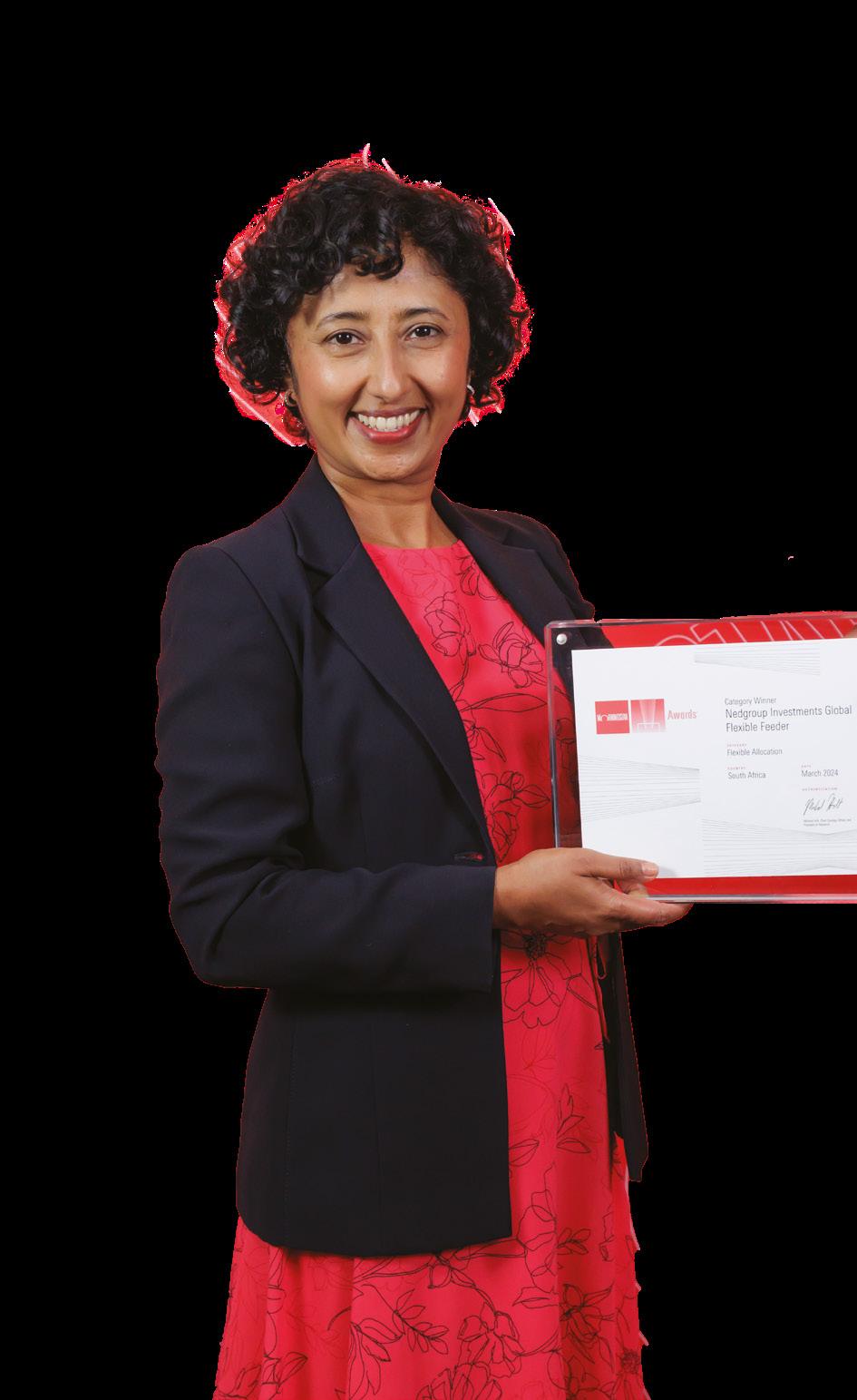



AWARDS 30 April 2024
16 www.moneymarketing.co.za
Keep calm and diversify... as the world votes

As fund managers and businesses around the world sit on a pile of cash waiting for national election results in at least 64 countries this year, local investors are urged to ignore the noise and not make knee-jerk investment decisions even as the levels of noise rise as we march towards 29 May.
According to Economist Iraj Abedian, Chief Executive Officer of Pan-African Investment & Research, the number of elections this year is consequential for the global economy and for fund allocations. “For the first time in the past 50 years, there is no shortage of money, funds and investable opportunities.
“Most important of all these is the US elections, with the prospect of Trump 2.0 changing global security and geopolitics considerably,” he says, adding that “such an outcome will have a massive impact on investment returns and security of investments”. This means that not only the fund managers, but also the corporates who are typically the source of foreign direct investment, must hold back, using the principle of “when in doubt, sit it out”. Abedian adds, “For as long as the global picture stays uncertain, private sector investors are likely to remain prudent, doubtful and extremely cautious, but remain cash flush.”
BY SIOBHAN CASSIDY MoneyMarketing Contributor
What about the local market?
Focusing the lens on the individual South African investor, Izak Odendaal, Chief Investment Strategist at Old Mutual Wealth, says elections in other countries don’t generally matter much, apart from those in the US. Odendaal agrees that all eyes would be on the American election in November because it “could be market moving”, and “when US markets move, SA markets are definitely also impacted”.
But for local assets, other experts agreed that any movement in the SA market as a result of the local election was likely to be on the upside, largely because the market had already taken account of much of the insecurity. Odendaal says, “a lot of bad news has already been priced into local assets” and there was “scope for a positive surprise once we get past the uncertainty of the local election”.
Senzo Langa, Deputy Chief Investment Officer at Alexforbes, says that, given the possible impending shifts in the global political landscape, “it may be fortuitous that large South African fund managers keep a healthy exposure to local assets”. He adds that favourable valuations are also driving this.
Old Mutual Investment Group (OMIG) also says they were starting to see some value come through in South African equities. Meryl Pick, OMIG Head of Equities Research, says that while some may see this as surprising considering the amount of uncertainty surrounding the elections, “the best approach against this backdrop is diversification and, currently, local appears lekker”.

She adds, “There is so much negativity priced into the rand and bond yields – sentiment is low, offshore investors have run away, and we have fallen out of many global indices. If we hold a peaceful election that delivers either a small ANC majority, or coalitions between the ANC and other small parties, or the ANC and a moderate opposition, we could see a significant rally in local-facing equities and bonds. Considering these numerous scenarios and unknown variables, diversification is indeed our strongest defence against such uncertainty,” Pick concludes.
“It may be fortuitous that large South African fund managers keep a healthy exposure to local assets”
Avoid the panic
Odendaal concurs, adding that a ‘positive’ election outcome could see local bonds rally; a ‘negative’ outcome could see the rand weaken, boosting offshore investment values. “Having a diversified portfolio can hedge against most outcomes.”
The various managers’ agreement extends to the idea that local investors, as far as possible, should try to stay calm and not make knee-jerk investment decisions, even as the levels of noise and disinformation rise as election day approaches. Langa from AlexForbes encourages investors to remain committed to their financial goals.
None of this is to ignore the many crises that South Africa faces. As Abedian says, “Our many national crises – from loadshedding to the ports and the railways – are opportunities for investors. The money is lined up, and the opportunities are many-fold.” The thing that connects the two is leadership, he adds, looking hopefully toward a year of elections or, at least, to the local one on 29 May.

30 April 2024 INVESTING IN AN ELECTION YEAR 18 www.moneymarketing.co.za IMAGES Shutterstock .com
Impact-driven investments key in times of macroeconomic turbulence
The private equity (PE) sector, much like its investment industry counterparts, has felt the impact of the tough macroeconomic climate. The past year has seen the convergence of geopolitical tensions abroad, the volatility of financial markets and heightened inflationary pressures. For some of the country’s leading retirement and pension funds, the turbulence of the times has warranted a renewed focus on private markets as a way of maximising the impact potential of their investments.
This was one of the key focal points in a panel discussion entitled A Glimpse into the LP Mindset Right Now in Light of the Global Macroeconomic Climate. The panel was part of the two-day programme at this year’s 2024 SAVCA PE Conference, hosted by The Southern African Venture Capital and Private Equity Association.
A commitment to driving societal change
Participating in the panel was Solly Matheba, Chairperson of the Tshwane Municipal Provident Fund. Adding to the conversation on the ability of PE investments to change lives and livelihoods, he explained that the point of departure for LPs like the Tshwane Municipal Provident Fund is to “make the money work for the members”.
“Our point of departure is simple: the money we allocate does not belong to the committee or even to the asset managers. It belongs to the members. So as an LP, we must ask ourselves how we can make

it work for them. Unlike listed markets, PE investments give us the opportunity to address the unique needs of people on the ground – needs such as healthcare, sanitation and housing ownership.”
Although the priority is to make a difference in the lives of the fund’s 6 000 members, the real impact must be farreaching. “An impact made at the level of villages, peri-urban and semi-rural areas is an impact made to South African society,” said Matheba.
He emphasised the importance of intentionality: a targeted and mandated approach to allocating to transformed asset managers, which provided a segue into the next point of discussion.
Transformation as a driving force of impact
For Mantuka Maisela, Chairperson of the Motor Industries Retirement Fund (MIRF), the past few years have exposed many inefficiencies on the ground, as well as the need to address issues such as service delivery and critical infrastructure. The macroeconomic challenges following the Covid-19 pandemic have exacerbated many of the issues faced by everyday South Africans.
In her opinion, a renewed focus on impact is crucial – and PE is equipped to do that, but the key to maximising that impact lies in transformation. As she argued, the financial sector has been largely unwelcoming to women, people of colour and people with disabilities.
Exclusionary policies, however, represent a missed opportunity to tap into invaluable opportunities to allocate assets in a way that truly makes an impact.
It has been her experience that women fund managers – many of whom come from areas like the one in which she worked as a young person – share her passion for investing in the needs of under-serviced and overlooked communities. “When you allow a diverse group of people to raise and allocate capital, you increase the impact potential of those investments.
“As a fund, therefore, we have made a concerted effort to support women asset allocators who, in turn, are deeply invested in improving living conditions and meeting basic human needs in these communities. So far, they have not disappointed us,” she said.
Adding value where it matters most
Adding her perspective on the topic was panellist Grace Chauke, Investment Officer at the Transport Sector Retirement Fund (TSRF), who referred to impact-driven allocations as “investments into real assets”. Some of the country’s most pressing socioeconomic issues have become focal points for the TSRF – issues such as the record-high unemployment rate and the need for township development. As an LP, Chauke recognises the importance of investing in solutions that will add value to the lives of members.
For the TSRF, whose members are mostly truck drivers, the fund has looked specifically

“This strategic approach underscores the importance of adapting investment strategies to mitigate risk and capitalise on emerging opportunities in uncertain times”
at the unique needs of their members. For example, the fund considered investments that could improve the working conditions for truck drivers, as well as places of rest along their journeys, as a way of addressing the high level of accidents on the long road.
Approaches such as these address both the financial aspects of PE investments, as well as the social factor, which is, in Chauke’s opinion, equally as important. PE also holds the added benefit of diversification.
The added benefit of diversification
Speaking to this point was Morula Digoamaye, Unlisted Investments Manager, at the Government Employees Pension Fund (GEPF). As he explained, the GEPF initially focused on infrastructure investments before heavily allocating to private equity, both of which proved beneficial even prior to the onset of Covid-19, amidst economic slowdowns in 2018 and 2019. However, given the evolving landscape, diversification has become increasingly imperative.
Most recently, the GEPF is expanding its portfolio to include private credit, which provides shorter-term yield opportunities and the potential for quicker self-liquidation. “This strategic approach underscores the importance of adapting investment strategies to mitigate risk and capitalise on emerging opportunities in uncertain times,” he said.
Constructive discussions to pave the way forward
Concluding the panel was Kgomotso Ramokala, Principal Officer of the Telkom Retirement Fund, who said that discussions such as these, around the need for impact – particularly at the level of the ‘second economy’ – alongside the commercial viability of investments, will become increasingly important.
In South Africa, the notion of the ‘second economy’ refers to a parallel economic structure that exists alongside the formal, regulated economy. This informal sector plays a significant role in the South African economy, particularly in terms of providing livelihoods for millions of people who are unable to access formal employment opportunities.
“If we do not invest in our second economy, we will not have a country to retire in. We must act now to protect our collective future, and PE has the tools we need to do that,” he said.
IMAGES Shutterstock .com
INVESTING IN AN ELECTION YEAR 30 April 2024 www.moneymarketing.co.za 19
The fate of income fund returns
BY JEAN-PIERRE MATTHEWS CFP, CFA Head of Product, Matrix Fund Managers
During the Covid years, most central banks initiated extensive, synchronised monetary stimulus. Global interest rates were slashed, and many central banks engaged in quantitative easing to flood global markets with cheap money to increase disposable income and fuel economic recovery.
But this was ultimately inflationary and, combined with disrupted global logistics and the Russia-Ukraine conflict, prices soared. To combat high inflation, a policy rate hiking cycle commenced in early 2022. We are now probably at the top of this cycle as global inflation is tamed and fears turn instead to economic recession.
With the world’s attention focused on the US Federal Reserve, and expectations of imminent US rate cuts, the rest of the globe is expected to follow suit. Investors have been spoilt with high yields over the last few years, and income funds have performed very well relative to other categories. But will these funds remain a good option for investment?
Massive flows into fixed income funds
In the SA unit trust industry, the AUM of fixed income funds (excluding money market funds) surged from R250bn at end-2015 to around R820bn at end-2023, reaching 33% of total SA industry assets (excluding money market funds).
What’s driving this growth?
While the rate hiking cycle contributed to the flow into interest-bearing assets, a crucial factor has been the steady decline in South Africa’s global sovereign credit rating, resulting in higher yields.
Figure 2 shows how the 10-year SA sovereign USD debt credit spread (red line) has fluctuated and deteriorated over the past decade. First it tracked the A-rated sovereign spread (e.g. China) and then the BBB-rating spread (e.g. Mexico) and then it leapt to the BB-rating spread (e.g. Brazil).
What the graph also shows is that the SA credit spread anticipated each looming rating downgrade, moving well ahead of official announcements. While SA is currently rated BB, our spread is edging towards a B-rating (e.g. Turkey), indicating that international markets are concerned about a further sovereign credit
downgrade. At present, SA needs to pay around 3.5 percentage points (%pt) per annum more for 10-year equivalent debt than AAA-rated sovereigns and about 1%pt more than the average BB-rated sovereign.
Bad news can be good news...
The bad news is that SA is a high-yield country. The SA government, and therefore most SA borrowers, need to pay more in interest payments. The South African Reserve Bank (SARB) has also had to keep policy rates higher to attract capital, support the rand and maintain price stability – and the cost of debt has increased across the yield curve.
However, if you are a net saver, the good news is that we are a high-yield country! You will be earning more interest now than you would have before our sovereign downgrades – all else being equal. In fact, you can now earn an unprecedented high real yield by investing in a regular fixed deposit. One-year fixed deposits currently yield 9% per annum – that is more than 3% above expected inflation. Who says you can’t beat inflation by investing in the money market?
“With inflation fears subsiding and recessionary fears brewing, markets are widely expecting interest rate cuts”
What about rate cuts?
With inflation fears subsiding and recessionary fears brewing, markets are widely expecting interest rate cuts. In the US, inflation peaked at 9.1% in mid-2022, and retreated to 3.2% in February 2024. The US Fed Funds policy rate was steadily raised from 0% to 5.5% as inflation surged, and is now expected to be cut by some 100 basis points over the next year.
In SA, inflation peaked at 7.8% in mid-2022, falling to 5.6% in February this year. The SARB also steadily raised its repo rate from an unprecedented low of 3.5% in 2021 to 8.25% in May last year. SA market participants expect


the SARB to start cutting the repo rate later this year. At Matrix Fund Managers, we agree that global policy rates should decline, but we believe that the timing of SA monetary policy accommodation will lag that of the US and developed markets by more than the market expects – possibly only seeing rate cuts late in 2024 or early in 2025.
With the US real policy rate currently at historic highs – around 3%pt (300 basis points) above expected inflation – it’s at a similar level to SA’s real policy rate and is placing pressure on the rand.
We expect the SARB to start cutting the repo rate once SA inflation settles around the midpoint of the target range (4.5%) and the US real policy rate is around 1-2%pt lower than the SA real policy rate. We also foresee the SARB maintaining its real policy rate around 2-3%pt above expected inflation.
Outlook for income funds
We believe that fixed income yields will continue to offer good value to investors – especially income funds.
Our base case scenario sees money market deposit rates down by around 0.75%pt over the forecast period, with most of the move occurring only in 2025. Furthermore, rates should only move lower when inflation settles at lower levels. This means that the real yield earned on income fund investments is likely to remain at elevated levels over the coming year.
In short, deposit rates may start falling later this year, but real yields offered by income funds should remain as compelling as they were in 2023 (around 3% above inflation).
Moreover, with these high real yields on offer by the SA government and major banks, it should not be necessary to invest in less-liquid, higher-risk corporate and securitisation debt to achieve inflation-beating income fund returns.
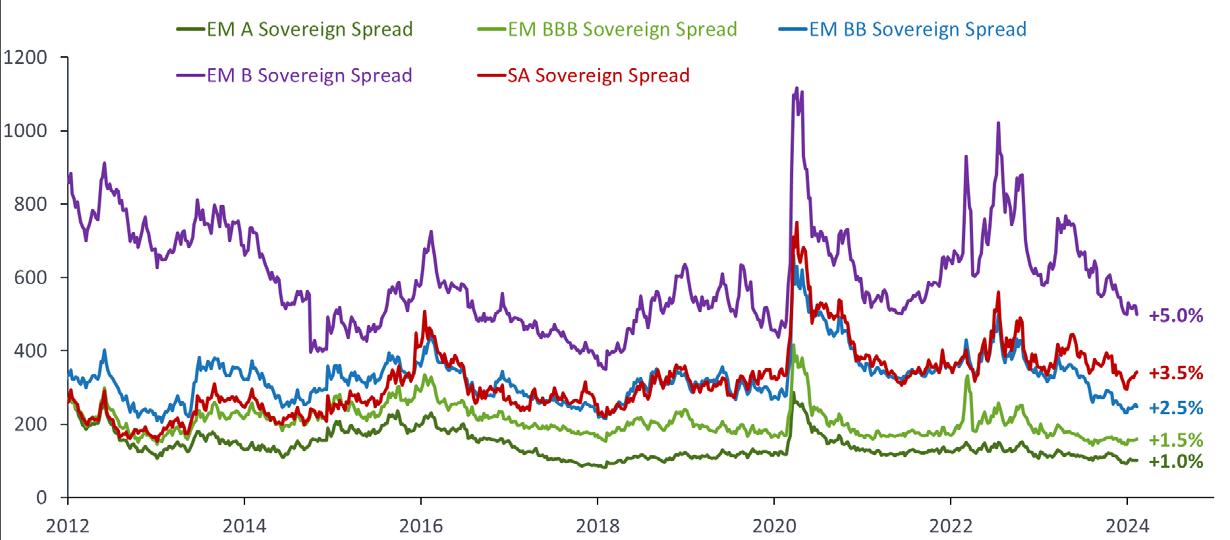
30 April 2024 BOUTIQUE ASSET MANAGERS 20 www.moneymarketing.co.za
FIGURE 1: SA FIXED INCOME UNIT TRUST FUNDS (EXCLUDING MONEY MARKET FUNDS)
ASISA (IB are Interest Bearing funds; MA are Multi Asset funds) Source: Bloomberg, February 2024
FIGURE 2: SOVEREIGN CREDIT SPREADS
Source:
The importance of a dynamic investment process
BY ANN SEBASTIAN Head of Equities, Terebinth Capital
Terebinth Capital was founded in 2013 and has grown into a 100% management-owned boutique investment manager with approximately R33bn in assets under management (February 2024). The firm is a Level 1 B-BBEE contributor with majority female ownership.
Our vision and mission have the dual objectives of excellence and progress. We want to be considered by investors as the number one boutique manager by consistently delivering leading risk-adjusted returns. In addition, the focus on growth, sustainability and consistency is driven by our unique pay-it-forward philosophy that leans heavily on the spirit of Ubuntu and is enshrined in the principles of true diversity, equity and inclusion (DEI).
We are a focused, responsive boutique with a passion for serving clients. Clients are at the centre of our business. We have a deep level of accountability for managing client assets and pride ourselves on our risk management capabilities as money managers. While our genesis lies in fixed income hedge funds, we have assembled a team of experts across the major product capabilities – fixed income, listed property, credit, equities, and multi-asset.
“We have a deep level of accountability for managing client assets and pride ourselves on our risk management capabilities as money managers”
Our investment philosophy is anchored on cycle theory, as markets are inherently cyclical, prone to periods of over-optimism and over-pessimism. We apply a two-fold approach to determine asset allocation, combining macro analysis and quantitative precision. We believe a macro philosophy leads to low correlation with broader markets and reduces volatility of returns. Using scenario analysis, we construct diversified portfolios that always reflect our best-investment view. We value scenario analysis, as it is impossible and imprudent to position for a single outcome. Our active approach incorporates disciplined risk management.
Equity a natural extension of Terebinth’s philosophy
With a solution-oriented mindset and our clients’ trust, we launched the equity unit in 2022 and currently manage almost R500m in the listed equity space across institutional and retail assets. The general equity unit cross-pollinates with the entire investment team and manages a combined circa R1bn. Listed property and macro research is performed by Kanyane Matlou, fundamental research is undertaken by Athenkosi Mjebeza, and ESG research is conducted by Oyena Mtuzula.
As with our house philosophy, we believe equity markets are inherently cyclical, prone to periods of ‘greed’ and ‘fear’ that impact the short-term drivers of stock market returns. Wide-ranging research has shown that earnings growth is the primary driver of long-term share price appreciation. Applying bottom-up research to interrogate fundamentals, we identify high-quality companies with attractive earnings growth potential
trading at reasonable valuations. Due to fundamentals being highly influenced by global dynamics, a topdown, macro approach is incorporated for tactical sector allocation.
Resilience in diversification
We do not position our portfolio for a single investment outcome; hence we apply a multi-style stock selection approach, which leads to a more comprehensive assessment of equity investment opportunities than any single style approach. This enables us to position in resilient companies that offer our clients a stable path to superior returns – an approach that wins throughout the cycle. Our clients benefit from our differentiated style approach, which leads to a low correlation with the broader market. Our comprehensive macro understanding combines experienced in-house macro research and quantitative insight to answer “where to next” and what that implies for sector returns and risk. Knowing where we are in the cycle allows us to identify sector opportunities. Combining rigorous quantitative stock modelling with fundamental and macro research leads to our dynamic approach to security selection and sector selection. This allows us to take advantage of markets’ cyclical nature within the impact of structural shifts. A holistic, bottom-up, and top-down approach is what sets us apart.
South African equities face significant challenges, but they are extremely undervalued. From a topdown perspective, we are cautiously optimistic about the medium-term outlook for the domestic economy. Challenges are set to improve, potentially shifting from headwinds to tailwinds. Firstly, loadshedding is expected to be less intense because of energy reforms and new generation capacity in the pipeline from the private sector. Secondly, the SARB is expected to cut rates later this year. Lastly, select sectors in the local economy are also set to benefit from the progress, albeit sluggish, at Transnet and its ports. We can take advantage of this theme within the consumer-facing sectors as they

stand to benefit from this improving landscape. We have positioned accordingly in our portfolio where opportunities present themselves.
South Africa remains a small, open economy affected by global risk sentiment, which has been a headwind as investors remain on the sidelines until local elections play out. In this uncertain environment, from a bottomup stock selection perspective, we can build resilience in our portfolio by investing in high-quality companies with strong operational track records. We search for companies with firstly ‘High Earnings Visibility’ – decent earnings growth prospects and positive earnings revisions – and secondly ‘Yield Support’ – attractive dividend and cashflow yields. Figure 1 illustrates the companies that rank highly within the ‘consumer sectors’ based on these two characteristics. Upon further interrogation of the fundamentals, and in line with our philosophy, AVI, Truworths, Mr Price, Clicks, Bidcorp, Oceana and Shoprite currently meet our requirements.
Dynamic in thinking, and application
A dynamic investment process involves not only being active, but also having a deep understanding of the market factors underlying our investment universe. As such, we invest in deep and liquid parts of the market, which allows us to adapt quickly to macro and micro changes that affect companies’ earnings outlook. It is imperative to own a well-diversified portfolio that is positioned to perform effectively under most economic outcomes, rather than focusing on a few positions that will do well under a single economic outcome.
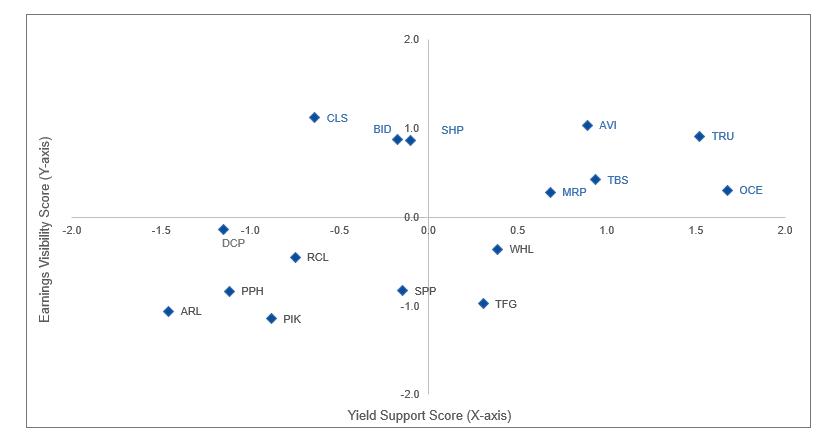
Source: Terebinth Capital
30 April 2024 BOUTIQUE ASSET MANAGERS 22 www.moneymarketing.co.za
FIGURE 1: CONSUMER STOCKS WITH EARNINGS VISIBILITY AND YIELD SUPPORT


WAddressing financial abuse is key to enabling investment in women
BY BULI NDLOVU Executive Head: Nedbank Retail & Business Banking Marketing
ith South Africa celebrating Freedom Month in April, it’s imperative to address the disempowerment of women in society and strive for real inclusion that enables true gender equality.
While a global commitment to uplifting women by fostering educational, healthcare, employment and leadership opportunities is essential, all these efforts and investments cannot deliver their full impact if they occur under a cloud of gender abuse. While there is widespread awareness of the debilitating effects of physical and emotional abuse against women, one insidious barrier that continues to hold many women back is financial abuse –an often-hidden form of coercive control that robs victims of their economic autonomy and freedom.
According to Family and Divorce Law in South Africa, a third of all adults in South Africa have experienced economic abuse in some form. It’s not surprising, given South Africa’s unacceptably high rate of domestic violence, coupled with the findings of the Centre for Financial Security in the USA, that 99% of people who had suffered domestic abuse of any sort had also been subjected to financial abuse. While it is true that abuse can be inflicted on any gender, the still highly patriarchal social system in South Africa means that most victims in this country are women.
Before we can truly say that we are investing in, and including, women, we must first address this scourge of financial abuse that permeates our society. No amount of education, healthcare, or employment opportunities will accelerate progress if women remain trapped by abusive partners restricting their financial independence.
Financial abuse occurs when one partner exerts control over the other's freedom of access to economic resources, creating an intentional state of financial
precariousness and dependence. The abuser may limit the victim's knowledge about finances, restrict their ability to work, steal money or assets from them, or rack up debt under the victim's name through coercion or fraud. All of which ultimately undermines the victim's capacity for self-sufficiency and, more concerningly, causes them an inordinate amount of stress and fear.
On the surface, financially abusive behaviour may seem subtle, like monitoring spending, forbidding employment, or providing an inadequate ‘allowance’ to women who are not earning their own income. But the psychological impacts can be devastating, breeding anxiety, low self-esteem, and a shattering loss of autonomy. Financial abuse is intended to make victims feel powerless and isolated with no means to support themselves outside the relationship.
In South Africa, where over a third of households are headed by women who are often the primary earners, one would think that the opportunity for the financial abuse of these women would be lower; but this is not the case. Studies show financial abuse persists despite the evolving gender roles in this country. Even when women contribute economically, or are the sole breadwinners in a
“Financial institutions have a vital role to play in this work. More than providing basic banking services, we must strive to be active allies”

home, abusers leverage patriarchal attitudes, and often threatening behaviours, to maintain coercive control of their finances. This both disempowers women and perpetuates regressive gender stereotypes.
Unfortunately, financial abuse is frequently overlooked, and our society still fails to recognise economic exploitation as a legitimate form of domestic violence on par with physical or emotional abuse. It could even be argued that many financial abusers aren’t even aware that their actions constitute abuse. However, financial abuse is a crime, albeit one that has shockingly few legal protections or avenues for recourse in South Africa.
We urgently need to change these misperceptions, primarily by reframing financial abuse from a ‘private matter’ to highlighting it as the human rights infringement that it is. For too long, the burden of escaping abuse of any sort has fallen squarely on the shoulders of the victim. Attitudes towards financial abuse are no different, as is evidenced by the well-intentioned, but impractical advice often given to victims to secretly stash money or change their banking details. These ignore the fact that taking these actions will almost certainly incur the wrath of the abusers, likely resulting in increased violence. True solutions must go further by prioritising survivors' holistic safety and helping them to empower themselves in ways that do not put them at further risk of abuse.
Building that path forward starts with fostering greater awareness of financial abuse. We must create space for open dialogue to destigmatise this issue, while helping victims to identify the abuse and understand their rights and options without fear of judgment. Just as importantly, we need comprehensive economic policies and partnerships to support survivors' journeys from crisis to long-term financial independence, resilience and self-sufficiency.
Financial institutions have a vital role to play in this work. More than providing basic banking services, we must strive to be active allies, uplifting women's economic security through empathy, education and advocacy –not only investing financially in women, but investing holistically in their prosperity, safety and overall wellbeing.
For us at Nedbank, delivering this type of resiliencebuilding, empathetic and holistic support to women who are victims of financial abuse aligns closely with our purpose to use our financial expertise to do good. We are on a mission to create an inclusive space where all women can reclaim their economic autonomy and free themselves from abuse. This includes developing specialised services with community partners to guide survivors through recovery while building financial capabilities. It means raising awareness of this issue with our employees to help them recognise signs of financial abuse and respond with utmost care. And it means using our voice as a force for good to influence and drive policy reforms and social change.
Only once we dismantle the coercive systems enabling financial abuse can we clear the path to truly invest in women's progress and build environments characterised by full inclusion. Every woman deserves to live with dignity, free from the oppressive chains of economic exploitation. It is time to unite in shining a light on financial abuse and come together to empower survivors to rebuild their lives on the firm foundation of real financial independence.
30 April 2024 FINANCIAL FREEDOM 24 www.moneymarketing.co.za IMAGES Shutterstock .com
Achieving financial freedom: Wealth creation and strategic planning
BY BURNADENE VAN DER MEULEN Structured Solutions Analyst: Bravura
South Africa celebrates Freedom Month in April, so it’s fitting to reflect on the concept of financial freedom and its importance in our lives. Financial freedom isn't just about maintaining a substantial bank balance; it's about having the ability to live life on your terms without being constrained by financial limitations. Realising this level of freedom requires detailed planning, smart investment decisions, and the guidance of informed financial and tax advisers.
When thinking about the concept of wealth creation, one can easily get entangled with the aspect of earning money capacity or the source that will create the wealth. However, it is equally important to consider the steps to take in order to preserve and grow your wealth for the future and future generations.
Financial advisers play a crucial role in helping individuals build wealth and attain financial security. They provide vital
insights, tailored strategies, and sound advice to navigate the complex world of finance. It is therefore important to keep your advisors informed of any life events or future plans in order to ensure a safeguard is put in place to cater for costs involved. Whether it's setting achievable financial goals, making prudent investment choices, or planning for retirement, a skilled financial adviser can make all the difference. Apart of growing investments, the benefit of having an adviser part of these discussions and plans are also that with certain investment products in the market, one may even get a tax deduction or benefit in the future.
One of the fundamental aspects of wealth creation is setting clear and realistic financial goals. These goals serve as a roadmap that in turn provides bitesize directions for the individual towards their desired financial outcomes. Whether it's buying a home, funding education of a loved one, or retiring in a sunny town
by the coast, having clear goals allows individuals to focus their efforts and resources effectively.
However, setting these goals alone is not enough; a solid investment strategy is essential for wealth creation. Diversification, risk management, and long-term planning are key elements of a successful investment strategy. Financial and tax advisers help clients identify suitable investment opportunities, whether it's stocks, bonds, real estate, or alternative investments, based on their risk tolerance and taking into account their financial goals.
Moreover, in the journey towards financial freedom, tax planning plays a big role. As noted earlier, a tax adviser who has a comprehensive view of an individual's financial planning can identify tax-saving opportunities and optimise their tax liabilities. From maximising deductions and credits to exploring taxefficient investment vehicles, tax advisers
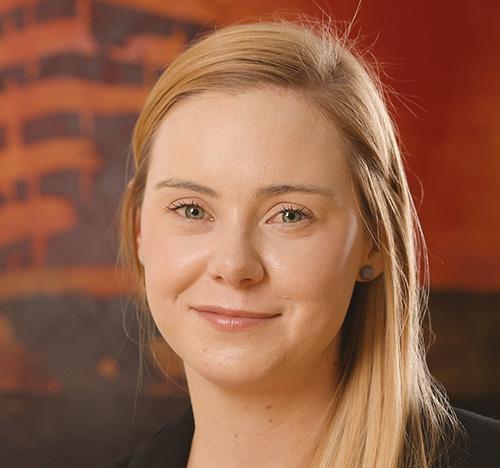
ensure that clients keep more of their hard-earned money.
Generational wealth transfer is another aspect often overlooked in financial planning. A well-crafted estate plan ensures that assets are passed down to future generations efficiently and according to the individual's wishes. Financial advisers work closely with clients to develop estate plans that minimise tax implications and preserve wealth for heirs, diverting the administration headaches that may accompany the loss.
Achieving financial freedom requires a multifaceted approach that includes setting clear goals, strategic investment planning, and tax optimisation. Financial advisers and tax advisers play integral roles in this process, providing valuable guidance and expertise every step of the way. As we commemorate Freedom Month, it’s important to recognise the importance of financial freedom and empower ourselves to take control of our financial futures.
The opportunity for fintech in Africa lies with its rising youth population
BY ISMAIL ALLY Chief Operations Officer, eZaga Holdings (eZaga)
Africa’s fintech sector is expected to be worth approximately $65bn by 2030, aligning with the United Nations (UN) projection that the continent's population will double to 2.4 billion by 2050, with half of the population being under the age of 25. The rapid growth of the fintech sector has been driven by its youthful demographic, technology advancements and adoption, and the socio-economic need for entrepreneurship.
This demographic trend, together with an increase in internet and mobile phone usage, is enabling fintech innovations and adoption to flourish. Young Africans, who are digital natives, are not only quick to embrace new technologies but are also driving the demand for more accessible, efficient and affordable financial services. This is in response to the traditional banking sector's limitations, where access to financial services has been a challenge, particularly in remote or underserved areas.
Ismail Ally, chief operations officer at eZaga Holdings (eZaga), highlights key trends he believes will influence the fintech sector in the coming months.
Increased financial inclusion using digital channels
Realising a financially included Africa has taken centre stage as more fintechs step in to bridge the gap between traditional banking services, and the unbanked or underbanked populations. These innovative companies are leveraging technology to offer accessible, affordable and tailored financial solutions.
Digital banking and the increase in adoption of digital payment solutions is the answer to extending financial services to unbanked and underbanked populations in Africa. The widespread increase in smartphone usage across Africa has fuelled an explosion in digital financial services, ranging from digitalonly banks and personal finance management tools to contactless payments and digital wallets.
By leveraging mobile technologies like this, digital banking services can reach people who previously had no access to traditional banking. This inclusivity promotes economic empowerment and poverty reduction.
When competition paves the way for innovations to thrive
The rise in digital banking services across Africa has led to a competitive environment that encourages innovation. Both fintech startups and traditional banks are rapidly innovating to provide more user-friendly, efficient and affordable services.
This competitive environment not only improves service quality for existing products like cross-border payment solutions and remittances, but drives the adoption of new technologies, such as blockchain for secure transactions and artificial intelligence for personalised banking experiences. As fintechs and banks vie to capture a larger share of the market, they are driven to explore untapped areas and cater to previously overlooked segments of the population.
Beefing up cybersecurity
Now more than ever, cybersecurity must remain a priority in the world of fintech. As we manage more of our day-to-day lives in an online environment, from banking to
shopping, keeping our information safe from hackers and cybercriminals is crucial. Companies are working tirelessly to build stronger defences against cybercrime, cyber threats, data breaches and system vulnerabilities to protect their customers’ data.
Today’s cybercriminals are so sophisticated that anyone can fall victim. This means it's not just about being careful online; it's about being informed and vigilant, with the onus on both fintech and consumer to take every precaution to protect their data.
By staying informed on the latest scam tactics and using the tools available to protect their digital lives, consumers can better safeguard themselves against these advanced threats.
Africa offers the perfect environment for fintechs to thrive, thanks to its young and growing population that is keen on using digital solutions to manage their money. This gives fintechs a chance to create services that really meet the needs of its young people, helping the sector grow.
www.moneymarketing.co.za 25 FINANCIAL FREEDOM 30 April 2024
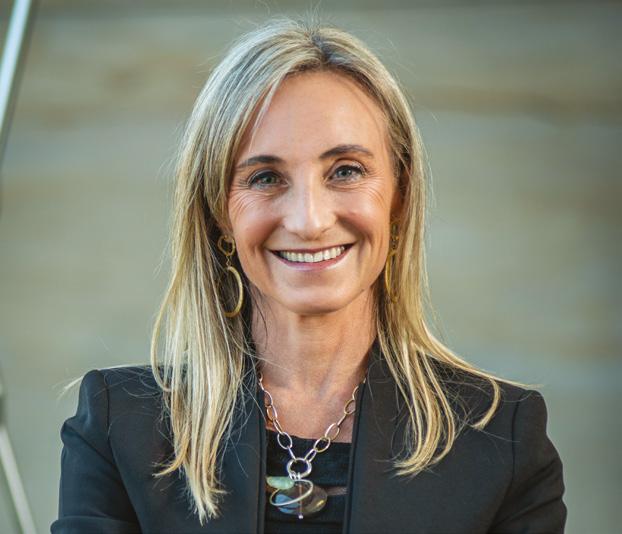 BY FLORBELA YATES
BY FLORBELA YATES
Head of Equilibrium
n an ideal world, people would appoint a financial adviser at the start of their working careers. But in real life, that seldom happens. People typically only seek the services of a financial adviser later in their career, and the trigger is often the realisation that they haven’t saved enough to retire comfortably. This obviously puts them at a huge disadvantage, since there is no making up for lost time.
But financial freedom is about investing now to ensure that you are left with the freedom to make the financial choices that you want throughout your life, rather than having to make choices based on the availability of money. To create true financial freedom, investors should consider the following:
steps towards financial freedom
• Find a financial adviser whose values are aligned to yours early on in your working career. The adviser should be willing to understand your needs, advise you on tax-efficient ways to invest any discretionary savings, as well as how to diversify wealth across different countries, products and asset classes. As your needs change throughout your life, from wealth accumulation through to the stage where you are reliant on drawing an income from accumulated investments, this person will prove key in adjusting your investments to meet your changing needs.
• Start saving the minute you earn your first salary. This discipline ensures that savings is part of your monthly budget and not an afterthought ‘if’ there is anything left over. It forces you to decide what you’d like to save first, and then spending only happens ‘if’ there is money left over, and not the other way around. I would suggest that this forced saving isn’t only via a corporate retirement scheme or retirement annuity but also with additional
discretionary monies, allowing you to create a nest-egg for unforeseen events that can then be financed from discretionary savings rather than through debt.
• Reevaluate your financial situation at least annually. This again allows you to ensure that it’s a disciplined process rather than an afterthought. In addition, it ensures that your financial adviser has insights into your requirements and can coach you on how to best achieve these.
• Ensure that the financial adviser you are working with stays up to date with the changing financial landscape, new legislation, as well as your personal circumstances. If not, it might be time to find a new adviser.
• Involve your dependants in your financial decisions. Benjamin Franklin had huge foresight when he suggested that “By failing to prepare, you’re preparing to fail”. If the inevitable happens, it’s best for your dependants to know about it and have the benefit of time and foresight to guide your choices.
Achieving financial freedom through a mindset change
BY DR KHOSI JIYANE Clinical Psychologist
In a world where financial challenges prevail, it’s important for financial advisers to acknowledge that clients are increasingly recognising that their financial wellbeing is not solely determined by numbers, but also by their mindset. Understanding the significance of changing mindsets towards money is becoming more widespread as people acknowledge the impact of their beliefs and attitudes on financial stability.
A client’s association with money will begin from how they are socialised with money in childhood, whatever their upbringing. Most poor financial decisions stem from how people think about money.
“It may be fortuitous that large South African fund managers keep a healthy exposure to local assets”
Dr Khosi Jiyane, a clinical psychologist specialising in transformative learning, accountability and change, emphasises the importance of the need to alter perspectives on money to enhance a client’s financial circumstances. According to Dr Jiyane, when people value themselves based on net worth, it’s misguided, as self-worth should not be equated with financial status. Furthermore, attempting to keep pace with the financial status of peers can lead to detrimental consequences, potentially resulting in financial distress, and not financial freedom.
To expand this message, Dr Jiyane advocates for a shift in thinking about money as a requirement for
These five steps may seem basic. The reality is that most financial choices are basic and just require a bit of discipline.
Developing a savings culture and making it part of your everyday thinking and then partnering with a financial adviser who coaches you and ensures you stick to your plans is often the reason that most of our clients can self-insure, take annual holidays, pay school fees upfront, and still retire comfortably while doing the things they’ve worked their entire life to enjoy.
Equilibrium makes it easy for you to help your clients achieve their goals and stay invested. We’re here to help you get your clients to their goals with more certainty and less anxiety, keeping them on their journey to achieving their investment goals. Visit equilibriuminvest.co.za to find out more.
Equilibrium Investment Management (Pty) Ltd (Equilibrium) is an authorised financial services provider (FSP32726) and part of Momentum Metropolitan Holdings Limited and rated B-BBEE level 1.


improving financial outlook. Seeking assistance when feeling overwhelmed by financial pressures is crucial, which is why organisations such as Metropolitan offer a range of resources to provide individuals with both psychological and practical support in managing their finances effectively. Collaborating with a financial planner can aid in creating a strategic plan to rectify financial missteps and avoid detrimental behaviours stemming from an unhealthy money mindset.
Dr Jiyani suggests sharing the following recommendations with your clients on how to remain mentally and financially strong this Freedom Month:
1. Foster transparent conversations about finances among your family and friends to cultivate a culture of openness.
2. Set definitive financial limits with your close ones to safeguard your financial stability.
3. Transition from a victim mentality to one of empowerment by proactively pursuing and developing avenues for financial advancement.
I
IMAGES Shutterstock .com
30 April 2024 FINANCIAL FREEDOM 26 www.moneymarketing.co.za
Key insights into South Africa’s asset management landscape
BY JANINA SLAWSKI Head of Investment Consulting
Alexforbes has released its 2023 Manager Watch™ Survey of Retirement Funds Investment Managers results. Janina Slawski, Head of Investment Consulting, described the survey as invaluable, covering growth trends and the integration of emerging technologies in the industry.
Key themes include:
Ninety One emerged as the largest single manager, while Alexforbes Investments led as the top multi-manager.
• South African multi-managers exhibited consistent growth compared to their single-manager counterparts, with the Assets under Management (AuM) ratio shifting from 86%:14% in 2016 to 77%:23% in 2023.
A notable increase was observed in the number of asset managers rated as level 1 contributors, with all top 10 managers and 19 out of the top 20 in the June 2023 AuM survey achieving this status.
In the Global BIV survey category, a significant portion of managers reflected high offshore allocations, with 34 out of 45 exceeding a 30% allocation, and 11 out of 45 surpassing the 40% mark. The peer group’s average exposure to offshore assets in December 2023 stood at 34.2%.
The adoption of artificial intelligence (AI) among South African asset managers remains modest, with only 31.8% of respondents incorporating AI into their investment strategies. This cautious approach indicates considerable potential for future growth in AI utilisation within the investment sector.
• Collaboration between asset managers and academia plays a pivotal role in enhancing financial literacy among clients and students, providing invaluable insights for improved financial understanding. As clients become more knowledgeable, they are better equipped to appreciate the expertise required by investment professionals to navigate the complexities of the investment landscape.
Survey highlights
This edition includes 28 surveys: 13 balanced, 14 specialist and one multi-manager. The key findings of the survey results include that in 2023, there was a 3% decrease in the number of asset managers participating in the Alexforbes surveys compared to 2022, along with a 9% increase in new strategies. The most significant increase, 36%, was observed among portfolios in the BEE survey from 2022 to 2023.
AuM survey highlights
Ninety One Asset Managers remains the largest asset manager, with a 6% increase in assets, solidifying its position. STANLIB AM retains second place with a 6% asset increase. Coronation moved to third place with an 8% increase in assets, surpassing SIM. Alexforbes Investments ranks as the top multi-manager in South Africa, showcasing a diverse portfolio approach. Multi-manager assets continue to grow, with a shift from single to multi-manager portfolios over the years. In 2023, total AuM increased by 12% over 2022, with the top 10 managers collectively holding 62% of the total assets.
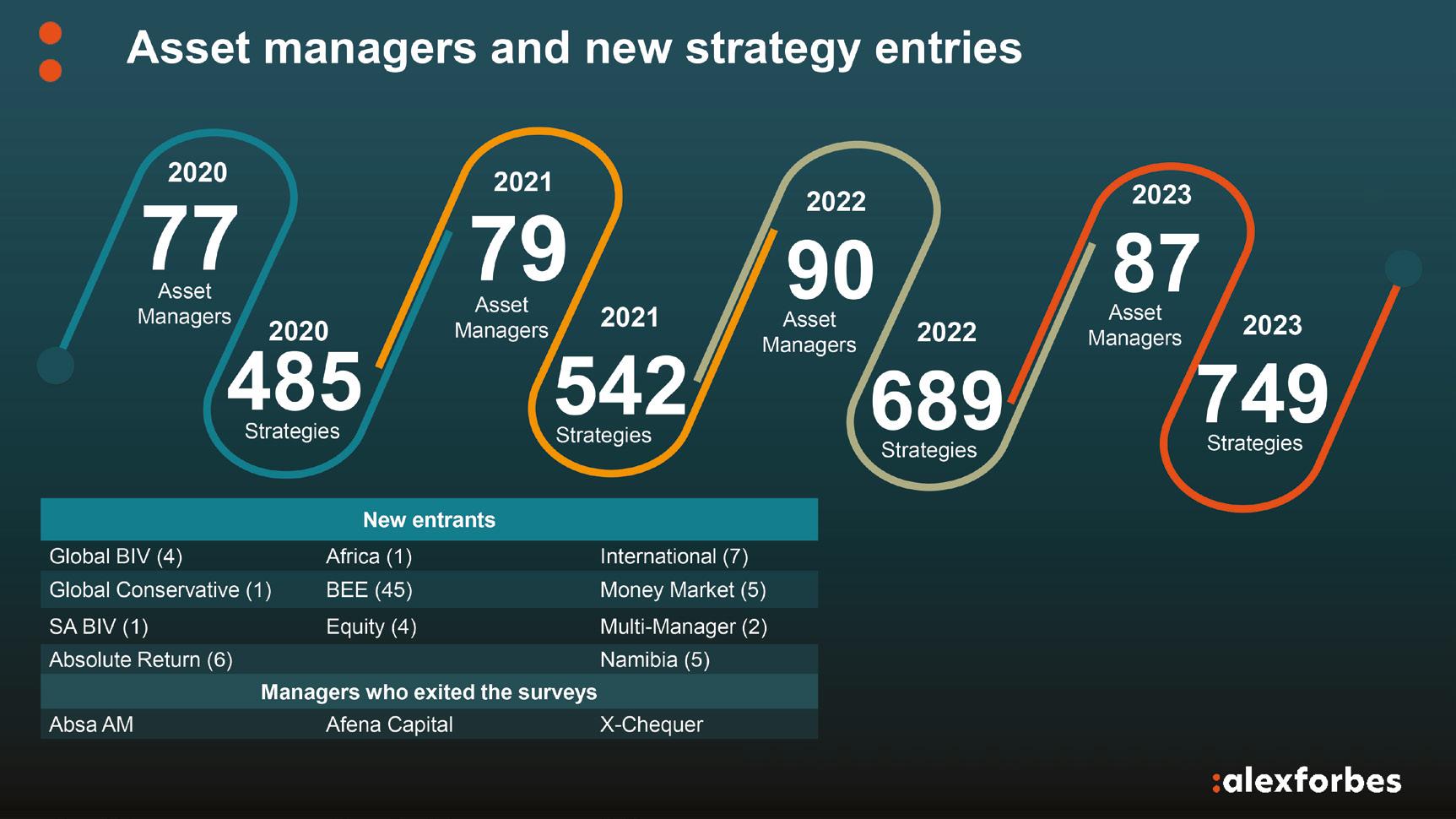
AuM survey universe summarised according to BEE contributor levels
In the latest survey, 51 out of 79 asset managers achieved level 1 contributor status, an increase from 49 out of 70 last year. Notably, all top 10 asset managers from the June 2023 AuM survey, as well as 19 of the top 20, were rated as level 1 contributors in 2023.
Environmental, social and governance (ESG) considerations
In 2023, the uptake of responsible investing principles saw a further increase. Sixty-nine asset managers participated in the AF surveys, endorsing CRISA, compared to 62 in 2022. Additionally, 59 asset managers signed up for PRI, compared to 48 in 2022. This growth underscores a continuing trend towards the integration of ESG factors into investment and business decisions, highlighting an enhanced commitment to sustainability within the investment industry.
SA Equity Manager Watch™ benchmarks
In the SA Equity survey, over half of the 81 participating portfolios use the FTSE/JSE Capped SWIX All Share Index (ALSI) as their benchmark, while just under a quarter of the portfolios have the FTSE/JSE SWIX ALSI as theirs. This will align in the near future due to the JSE Index Harmonisation exercise.
Fee survey
In 2021 and 2022, most asset managers transitioned from reporting separate fees for domestic and international assets within their global balanced funds to providing a single total fee for these portfolios. This trend continued into 2023, complicating fee comparisons across years. Managers were asked to standardise fees using a sliding scale framework based on distinct AuM bands, further enhancing fee transparency and comparability.
SA and Global Balanced Manager Watch™ – Best Investment View
In the Global Best Investment View category of the Manager Watch™ Survey, performance for the year
“A notable increase was observed in the number of asset managers rated as level 1 contributors”
surpassed domestic mandates by 4.5%, with median returns of 12.6% and 8.1% respectively, driven by strong global equities. Out of 45 surveyed managers, 34 exceeded a 30% allocation to international assets, with 11 surpassing 40%. Average exposure to international assets rose to 34.2% in December 2023 from 29.9% in December 2022. Only four managers had international asset exposure below 30% by more than 5%.
The integration of artificial intelligence and machine learning
The asset management landscape in South Africa is witnessing a profound shift driven by the integration of artificial intelligence (AI) and machine learning (ML). A survey of 24 asset managers sheds light on this transformation, revealing insights into adoption rates, benefits, challenges and industry prospects. Currently, only 32% of asset managers have embraced these technologies, indicating early-stage adoption. However, this cautious approach underscores significant growth potential. As the industry evolves, strategic investments, skill development, ethical considerations and fostering collaboration will be vital for maximising the potential of AI and ML.
Converging paths of asset management and academia
Improving investment knowledge helps investors and asset managers. Collaboration between academia and asset managers is important. The goal is not to make investors experts, but to help them understand investments better. This understanding helps them appreciate the skills needed by investment professionals. Together, asset managers and academia work to build financial wisdom, creating a stronger investment environment in South Africa.
RETIREMENT 30 April 2024 www.moneymarketing.co.za 27
Brokers drive innovation in the funeral industry
CLINTON MACDONALD CEO of KGA Life
Funeral brokers play a vital but often overlooked role in insurance innovation for the local funeral industry, which collectively conducts about 480 000 funerals a year in postCovid South Africa.
Clinton Macdonald, CEO of KGA Life, says South African funeral insurers would not have been able to adapt to the changing needs of customers to the degree that they have since the pandemic, were it not for the insights provided by the intermediaries who broker funeral policies. “Brokers are customer-facing, while insurers are not. Brokers drive customer-centric innovation and efficiencies in the funeral industry.”
Funeral product innovation is built on collaboration
Macdonald, whose company specialises in funeral policy underwriting and regulatory compliance, explains: “Brokers play a vital role in matching the exact needs of customers to the myriad of available financial services products out there. In the funeral industry, the broker takes on the important role of working closely with the product provider – the funeral insurer – to help design fit-for-purpose
funeral cover products. And in a market where most funeral policy sales take place through intermediaries, the broker fulfils an essential role for the insurer.”
Intermediaries in the funeral insurance industry play a greater role in shaping the industry than brokers in other insurance categories, says Macdonald. “Given that most funeral policies are sold through intermediaries such as funeral parlours, burial societies and church groups, who are deeply entrenched in the community, they are best positioned to measure customer needs and trends and feed this back to the insurers to guide product design.”
Personalisation trumps digitisation in the funeral business
While innovations in funeral insurance product design is influenced by rapid digitisation since the pandemic, Macdonald says digitisation still does not trump personalisation when it comes to creating new funeral products that customers want and need. “While digitisation of services is obviously part of the solution, customers still demand a more personalised experience.
“Intermediaries bring deep local
knowledge. They are often very localised within their communities and build trust with customers on a level that the product providers simply cannot attain themselves directly. Working together, intermediaries and insurers can achieve much better outcomes than if they’re trying to compete.”
“Highly respected local funeral services, who are trusted by the community, have their finger on the pulse of customer preferences”
An example of local knowledge is Vuyo’s Funeral Services from Mamelodi in Gauteng. “Customers' needs may vary in terms of region, demographics or other factors. Highly respected local funeral services, like Vuyo’s, who are trusted by the community, have their finger on the pulse of customer preferences. Thanks to insights such as theirs, funeral policies distributed through funeral parlours are
Technology can ease the claims process burden
BY AVINASH BABOOLAL Head of Claims at Hollard Life Solutions
The insurance claims process has long been associated with complexity, adding stress to claimants already facing challenging circumstances. However, recent advancements in technology are reshaping this process. When a client files a claim on a life insurance policy, they are experiencing a significant life-changing event. The claims process should, therefore, not add to their already stressful situation.
One of the crucial ways that technology is improving the claims journey is with artificial intelligence (AI) tools, which help streamline the assessment process, reducing the time it takes to process a claim. New technology also improves communication with clients and plays a vital role in fraud detection.
Data from the Association for Savings and Investment South Africa (ASISA) shows South African life insurers paid out a total of R287bn in claims and benefits to policyholders and beneficiaries in the first half of 2023. This highlights the importance of insurance in providing financial security during times of need.
The insurance industry is undergoing a significant shift, particularly in the way claims are handled – and technology has a big part to play in that. Hollard Life Solutions is among those insurers implementing technology to ease

constructed with the intention of the customer in mind; for instance, to use their policy benefits to pay fully for the funeral services.”
It all comes down to costs
Cost factors ultimately shape how funeral packages are designed, says Macdonald. “Sales and distribution of policies, and collection of premiums, are the greatest cost drivers in the funeral insurance business. Given that brokers are customer-facing, they can play a major role in helping to innovate around these cost-driving elements to help reduce the operational costs of provisioning funeral policies. In the end, cost is a factor that matters to the industry and its customers.”

that are needed are easily identified through this process. Once claims are logged, an assessor evaluates the risk of the claim and makes a decision. The client or their broker is then advised of the outcome of the decision. If a claim is approved, a payment is made.
Most issues in the claims process arise from delays in the submission of documents. Fraud also remains a challenge that insurers have to tackle, with clients submitting false information that then halt payments.
the convoluted and stressful claims process. Self-service portals now allow clients to manage their policies, submit claims, and update information conveniently and securely, from anywhere. Through strategic partnerships and innovative processes, policyholders now have access to their policy information via the customer portal. They can also submit claims through WhatsApp. This has improved efficiencies, significantly reduced turnaround times, and enhanced the overall customer experience.
Data analytics enable insurers to analyse trends, solve claim challenges and improve claims-related decisions. AI and machine learning continue to further enhance this capability, enabling predictive modelling for fraud detection and claims automation.
The use of technology is implemented through our direct book of business and is a testament to our commitment to leverage technology to improve the customer’s overall user experience. As the insurance industry continues to evolve, driven by technology and innovation, the focus remains on providing policyholders with an empathetic and seamless experience when they need it most.
Our aim is to make the claims process as easy as possible. We have a simple claims process whereby all claims are logged into a workflow and any requirements
To facilitate a smoother claims journey, advisers should encourage clients to ensure their premiums are up to date, to understand the coverage provided by their policy, and to verify that all personal details and beneficiary information are accurate. When making a claim, clients should be encouraged to provide all relevant information. Brokers and advisers can provide guidance to clients on requirements for claims.
“Data analytics enable insurers to analyse trends, solve claim challenges and improve claimsrelated decisions”
While human interaction is still essential in the insurance industry, industry players need to acknowledge the changing landscape of claims processing through the integration of AI-driven tools such as chatbots, optical character recognition, advanced analytics, and customer mobile apps. These innovations, combined with a userfriendly self-service portal, are expected to play a significant role in simplifying and enhancing the claims process for clients into the future.
30 April 2024 INSURANCE IMAGES Shutterstock .com 28 www.moneymarketing.co.za
First investment product provider to receive FSCA approval for crypto licence Navigating the cryptocurrency security maze
In a significant development for South Africa's financial landscape, the Financial Sector Conduct Authority (FSCA) has approved Jaltech (via its subsidiary Jaltech Digital Asset Holdings) as one of the few investment product providers to receive a crypto asset service provider (CASP) licence.
The significance of this development is that it grants Jaltech the licence to offer intermediary services for its cryptocurrency investments to open doors for financial advisers, institutional and retail investors to allocate a portion of their portfolio to cryptocurrencies. This is a pivotal moment in the integration of cryptocurrencies into the local traditional financial framework.
Gaurav Nair, a co-founder of Jaltech and head of fund management, says, "We are thrilled to be at the forefront of regulatory innovation in South Africa's financial sector. The FSCA's decision to grant Jaltech the CASP licence reflects a recognition of the firm's robust commitment to abide by regulatory requirements, stringent compliance standards, and commitment to investor protection.”
The FSCA’s move is in line with international steps to recognise cryptocurrencies as a legitimate
asset class, with regulators in the US approving a spate of Bitcoin ETFs this year, including one managed by BlackRock (the world’s largest asset manager), as well as the EU’s introduction of comprehensive legislation governing cryptocurrencies.
The FSCA’s approval has given the green light for institutional and retail acceptance and adoption of the asset class within the South African financial sector, and shows that South Africa is in-step with global trends.
As cryptocurrency regulations continue to move towards the mainstream globally, it is expected that more international and local investors will allocate a share of their investment portfolios to cryptocurrencies.
“It grants Jaltech the licence to offer intermediary services for its cryptocurrency investments to open doors for financial advisers”
 BY CAREY VAN VLAANDEREN CEO of ESET Southern Africa
BY CAREY VAN VLAANDEREN CEO of ESET Southern Africa
In an era where the allure of cryptocurrencies captivates the imagination of the global market, the double-edged sword of the decentralised and unregulated nature of these digital assets presents opportunities and significant security challenges for businesses.
The core principles of cryptocurrency – decentralisation and lack of regulation – can be seen as both a blessing and a curse. The relative freedom comes at the cost of increased vulnerability to cyberattacks, where financial transactions, traditionally considered the epitome of security, can also serve as a refuge for criminal activity.
There have been numerous examples of financial heists since the first cryptocurrency, Bitcoin, was released as open-source software in 2009. In 2022, the Ronin Network, a cryptocurrency network focused on gaming, confirmed that a staggering $620m had been lost. On the same day that the now infamous FTX declared bankruptcy under Sam Bankman-Fried, cybercriminals began stealing hundreds of millions of dollars from its coffers. In the Ronin Network case, the theft was attributed to the relaxing of security measures to accommodate an influx of players.
In many cases, cryptocurrency heists and the accompanying scandals highlight the critical need for enhanced security protocols and serve as a stark reminder that security cannot be an afterthought. It is imperative for the crypto industry at large, and any business engaging in cryptocurrency, to adopt a security-first mindset, akin to traditional financial institutions, to protect investors’ assets effectively.
As cryptocurrencies gain more mainstream acceptance, the threat landscape evolves along with it, making understanding and mitigating risks through comprehensive cybersecurity strategies something businesses cannot delay. Adopting a proactive approach to cybersecurity is not optional but a necessity, and should go beyond simply implementing security measures to weaving a fabric of security consciousness throughout an organisation.
Key strategies include thorough risk assessments, regulatory compliance, employing encryption protocols, multifactor authentication, and continuous transaction monitoring to detect and respond to threats promptly. In addition,

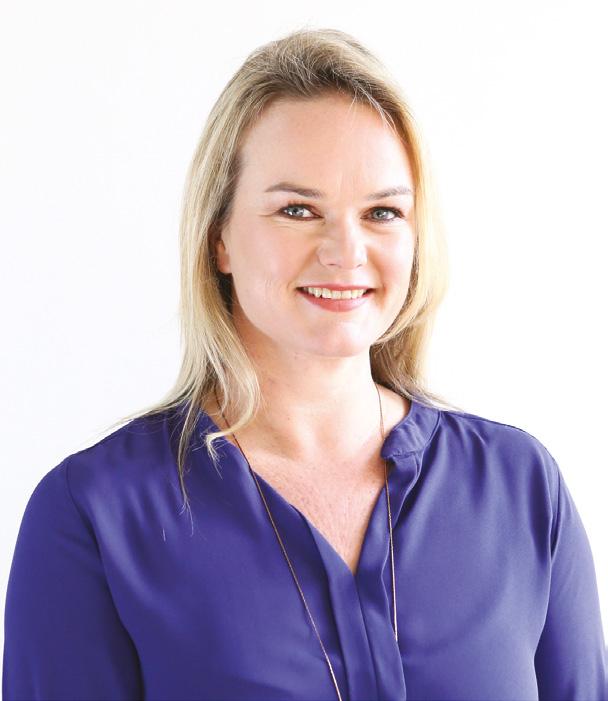
blockchain technology, which serves as the backbone of cryptocurrencies, offers significant security advantages. “Blockchain's inherent security features, including its resistance to tampering and transparent verification processes, present a formidable defence against cyber threats. Even so, it should not be viewed as a silver bullet. Businesses should complement these features with a holistic cybersecurity strategy to effectively counter the sophisticated threats we face today.
Cryptocurrency security encompasses a suite of solutions tailored to address the unique challenges of the digital asset ecosystem, which include designing secure architectures, implementing effective wallet and key management practices, while also fostering employee awareness and training to mitigate human error. In the cryptocurrency landscape, staying informed and prepared is key. The goal should be for businesses to empower themselves with the knowledge and tools to navigate this environment securely.
As governments worldwide begin to introduce legislation aimed at increasing transparency and accountability, the integration of cybersecurity measures will become increasingly critical.
“Embracing robust cybersecurity practices will not only protect against threats but also contribute to the stability and credibility of the cryptocurrency market. We are likely to see more innovative cybersecurity solutions come to the fore that secure the digital economy and foster greater trust among users and investors in cryptocurrency.
By embracing rigorous cybersecurity measures and leveraging blockchain technology, businesses can navigate the intricacies of digital transactions while safeguarding their assets and reputation. Businesses can harness the full potential of cryptocurrencies in a secure and resilient manner, ensuring a safer future for all stakeholders in the cryptocurrency space.
30 April 2024 www.moneymarketing.co.za 29 CRYPTOCURRENCY IMAGES Shutterstock .com
Is the Budget a more pragmatic approach to NHI?
BY YUGEN PILLAY Head of Public Sector at BDO South Africa
As the impending National Health Insurance (NHI) bill looms large on South Africa's political horizon, it is critical we take a pragmatic approach to its implementation. President Cyril Ramaphosa’s remarks at SONA, followed by Minister Enoch Godongwana 2024 Budget, coupled with the palpable urgency within government structures to use the Bill for its electioneering, indicate a swift progression towards its enactment. But we must not overlook the daunting constraints that accompany such a monumental undertaking.
Undoubtedly, the NHI represents more than just a healthcare reform bill; it’s a symbolic assertion by the governing party of its commitment to address the nation's healthcare disparities. But amid the fervour surrounding it, we cannot afford to ignore the elephant in the room – the budgetary constraints that threaten to stifle its realisation.
There’s a simple yet important question: Can we afford the NHI? The stark reality is that our current fiscal landscape is ill-equipped to shoulder the financial burden it entails. With a burgeoning budget deficit, less than desirable growth, and dwindling tax revenues, the prospect of financing the NHI through conventional means appears increasingly untenable.
In his 2024 Budget Speech, however, Minister Godongwana set aside R1.4bn for the next financial for the scheme. This reiterates the government’s intention to begin rolling out NHI, but to what extent? While some estimate NHI to cost around R200bn in total, it’s true cost remains

unknown. Then there’s the matter of the state of our current healthcare services.
Consider that almost 800 qualified doctors are currently without jobs in the country due to budget constraints. So, even if we have the necessary facilities, we can't even afford to place the doctors we currently have. That’s not to mention the exodus of skilled medical practitioners, which presents a further obstacle. How can we hope to implement a comprehensive healthcare scheme when we lack the necessary workforce to sustain it?
Healthcare is the heartbeat of the nation, and there’s no point having a system that doesn’t work, leading to a population that’s continuously sick. That in turn impacts productivity and the economy, creating a vicious cycle. Instead, we must adopt a multifaceted strategy that prioritises economic growth and human capital development. Rather than rushing into NHI implementation, we should focus on laying the groundwork for its success. This entails devising a comprehensive budgetary plan, at least a three-year phased implementation strategy and concerted efforts to retain our medical talent.
In his speech, Minister Godongwana did identify several areas where the NHI still needed to be developed before its rollout. This should provide some comfort as it indicates a realisation by government that, in its current form, they cannot afford to fully implement the scheme.
Crucially, we must engage with healthcare professionals to understand their concerns and address the systemic issues driving their departure. By fostering an environment conducive to their growth and development, together with the Health Professions Council of South Africa (HPCSA), we can stem the brain drain and fortify our healthcare infrastructure from within.
We also can’t afford to overlook the invaluable expertise of our senior specialists. Their mentorship and guidance are indispensable in nurturing the next generation of healthcare professionals.
Although the Minister acknowledges that further developments are required before NHI can be rolled out at scale, the incoming seventh administration – even if it’s a coalition government – may be more aggressive in implementing the scheme, in a show to radically transform the health sector. That said, for now, reason and logic prevail.
Ultimately, the success of the NHI hinges not only on its legislative passage but on the concerted efforts of all stakeholders to address the underlying constraints and seize the opportunity to redefine the future of healthcare in South Africa. It’s incumbent upon us to ensure that the promise of universal healthcare becomes a reality for all South Africans, without compromising the fiscal integrity of our nation.
Maximising revenue through digital health
BY NEIL KINSLEY Unu Health’s Head of Global Distribution and New Business Development

An ew world is opening up for brokers offering corporate and business clients employee wellness solutions. Until recently, brokers faced limitations in providing employers with comprehensive healthcare solutions, particularly for employees who could not afford traditional medical aid schemes. For the employer, this gap poses a risk to the business, especially if employees without medical cover experience illness. It results in high levels of absenteeism, impacting productivity. This is mostly due to employees who use public healthcare facilities having to take a full day off work to do so, firstly to travel to and from the facility, and secondly to wait in long queues for
medical attention and again for medication.
For brokers, the lack of affordable solutions for this segment of the working population means limited opportunities to scale their businesses or to respond to their clients' real needs.
Recognising this challenge, Unu Health, a digital health platform, has introduced a transformative solution to the market, which not only addresses the healthcare needs of a broader population but also presents a portfolio expansion opportunity for brokers.
The changing healthcare landscape
Unu Health is changing how people experience healthcare. The digital healthcare platform offers a range of healthcare packages for employees at all income levels, benefiting both employees and employers.
“In South Africa, approximately 5,5 million people in formal employment don’t have medical aid,” says Neil Kinsley, Unu Health’s Head of Global Distribution and New Business Development. “Not only does this place enormous strain on the public healthcare system, but it also poses a significant business risk to employers. Few know that, on a nationwide basis, more than two million workers are on sick leave on any given day, making South Africa’s absenteeism rate triple the global average. This represents a business risk and a broader socio-economic risk.”
Recognising the gap between such a large section of the population and quality healthcare, Unu Health has developed an innovative digital offering that allows brokers to scale their offerings to their clients, extend medical cover for all employees and mitigate the risks associated with absenteeism. Various packages are available for employers seeking to implement compulsory medical solutions, as well as for those wishing to offer voluntary solutions. These packages may be partially or fully subsidised by the company.
Unlocking revenue for brokers
Unu Health’s comprehensive range of packages offer easy access to primary healthcare through an always-on, userfriendly digital platform. Using an app on their smartphones, members can conveniently consult qualified nurses. The nurse will assess their condition and issue a prescription and sick note if required, or refer the member on to a doctor, if needed –all supported by a network of over 7 000 contracted doctors, specialists and pharmacies such as Dis-Chem and Clicks. With the advent of digital platforms such as Unu Health, brokers can now integrate affordable healthcare plans into their offerings and provide employee wellness packages tailored to meet the needs of all employees.
“From a broker point of view, this allows for a level of scalability that hasn’t been possible until now,” says Kinsley. “Brokers can now integrate affordable healthcare plans into their offerings, providing tailored employee wellness packages from as little as R165 per person per month. This newfound scalability represents a paradigm shift in the brokerage industry."
By offering affordable and accessible digital healthcare solutions, brokers can now tap into the vast unserved market for healthcare solutions in South Africa, driving not only the potential for revenue growth but also for building a larger client base that will provide cross-selling and upselling opportunities in the future, enhancing earnings over time.
Additional benefits for employers, such as an aggregated employee dashboard and insightful statistics, enable strategic HR planning. Tools like these can help employers manage high rates of absenteeism, improve productivity and vastly increase employee wellbeing, ultimately fostering a mutually beneficial environment for employers, brokers and employees alike.
"By harnessing the latest technologies, we are able to provide quick and effortless access to private healthcare,” says Kinsley.
HEALTH INSURANCE 30 www.moneymarketing.co.za
30 April 2024
Shared responsibility and private sector involvement essential for NHI
BY REO BOTES Managing Executive at Essential Employee Benefits
Our current healthcare system is a study of massive disparity, and there is no doubt that something needs to change to improve the quality of life for millions of South Africans. The vision of National Health Insurance (NHI) is to deliver equal access to quality healthcare for all citizens – an admirable aim. However, it faces many hurdles if it is to be effectively implemented. Even in developed countries, national health offerings face challenges around access, and they have far more mature models and infrastructure, as well as more resources than we do. If the NHI is ever to become a feasible reality that will benefit people rather than cripple our healthcare system further, there needs to be effective partnerships between the private and public healthcare spaces, extensive collaboration, and shared responsibility for the success of the model.
Coexistence is the key
One of the main challenges South Africa faces is a lack of resources, especially in the public sector healthcare space. Infrastructure is in short supply, particularly in rural areas, and the system itself is fragmented. While the theory of the NHI is to pool funds, this will not automatically improve access to quality care, reduce disparities or promote equitable healthcare. If these aims are to be achieved, it is essential that the existing infrastructure within the private sector is used as well, but it cannot simply be nationalised,
or it will face the same challenges as the existing public system does.
Public and private healthcare systems need to coexist, like they do with high levels of success in countries like Singapore and Australia. It is imperative to offer people choice, which improves both quality and efficiency. The private sector has resources, skills, and expertise in managing health insurance, which must be leveraged in a hybrid system. This sector will also be able to offer access to specialists and additional services faster, and they have the systems and processes in place to help people get the treatment they need. However, if this is simply slotted on top of the existing system, where will the money come from to supply services? Conversely, if it is a chargeable service and people are already being taxed for the NHI, the
“Public and private healthcare systems need to coexist, like they do with high levels of success in countries like Singapore and Australia”

gap between those who can afford these services and those who cannot will grow even wider, worsening the current situation.

Fraught with challenges
The implementation of the NHI is awash with challenges and opens up significant potential for financial mismanagement, nepotism and other issues that are already prevalent in the nation’s public sector. It cannot simply be written into law that the private healthcare sector will no longer be allowed to supply health cover for services paid for by NHI, because this will be to the detriment of all South Africans. There needs to be a balance between public and private sector interests into an equitable pool of services.
Unless sufficient healthcare services are first established in underserved areas, the initiative will fail before it gets off the ground. Funding allocation needs to be directed correctly and there must be robust monitoring systems in place to prevent mismanagement and theft, and to control leakage. Furthermore, service delivery must be closely monitored. The private sector has these systems in place, and they cannot be excluded from the equation. The case for the two sectors to work together is crucial for successful implementation. There also needs to be a strategy to improve working conditions and align income bases for public healthcare workers, otherwise doctors and healthcare practitioners will continue to leave the country to seek better opportunities overseas. Technology and innovation need to play a role in driving down cost and improving efficiency, as well as in improving access to healthcare – an example being telemedicine and virtual consultations. For this to happen, basic infrastructure concerns need to be addressed.
The reality is that there is a lot of work to do before the NHI can be considered, and government needs to engage not only with the healthcare sector but with South African citizens as well. Feedback needs to be analysed and concerns addressed, and the change needs to be managed properly, otherwise the people with the means to do so may leave the country, eroding the tax pool and further stifling the ability of the NHI to get off the ground. There must be robust discussion and stakeholder engagement, as well as a focus on change management. Inclusivity and engagement from all parties is the only way to ensure the NHI has a potentially positive outcome.

IMAGES Shutterstock .com www.moneymarketing.co.za 31 © Copyright MoneyMarketing 2024 ADVERTISING EDITORIAL DISTRIBUTION & SUBSCRIPTION PUBLISHING TEAM Johannesburg Office: New Media, a division of Media24 (Pty) Ltd, Ground Floor, 272 Pretoria Avenue, Randburg, 2194 Postal Address: PO Box 784698, Sandton, Johannesburg, 2146 Cape Town Head Office: New Media, a division of Media24 (Pty) Ltd, 8th Floor, Media24 Centre, 40 Heerengracht, Cape Town, 8001 | Postal Address: PO Box 440, Green Point, Cape Town, 8051 Tel: +27 (0)21 406 2002 | newmedia@newmedia.co.za CONTACT FELICITY GARBERS Email: felicity.garbers@newmedia.co.za Tel: +27 (0)78 758 6227 GET A 12-MONTH SA SUBSCRIPTION FOR ONLY R494! (SA postage only, including VAT) SUBSCRIBE TO ACTING EDITOR: Sandy Welch sandy.welch@newmedia.co.za ART DIRECTOR: Julia van Schalkwyk SUB EDITOR: Anita van der Merwe DIGITAL CONTENT CO-ORDINATOR: Mpolokeng Lechoba KEY ACCOUNT MANAGER: Mildred Manthey Cell: +27 (0)72 832 5104 mildred.manthey@newmedia.co.za Felicity Garbers felicity.garbers@newmedia.co.za GENERAL MANAGER: Dev Naidoo HEAD OF COMMERCIAL: B2B: Johann Gerber Johann.gerber@newmedia.co.za PRODUCTION MANAGER: Angela Silver angela.silver@newmedia.co.za GROUP ART DIRECTOR: David Kyslinger DIGITAL MANAGER: Varushka Padayachi Unless previously agreed in writing, MoneyMarketing owns all rights to all contributions, whether image or text. SOURCES: Shutterstock, supplied images, editorial staff. While precautions have been taken to ensure the accuracy of its contents and information given to readers, neither the editor, publisher, or its agents can accept responsibility for damages or injury which may arise therefrom. All rights reserved. © MoneyMarketing. No part of this publication may be reproduced, stored in a retrieval system or transmitted in any form or by any means, photocopying, electronic, mechanical or otherwise without the prior written permission of the copyright owners. © MoneyMarketing is not a financial adviser. The magazine accepts no responsibility for any decision made by any reader on the basis of information of whatever kind published in the magazine. MoneyMarketing is printed and bound by CTP Printers - Cape Town MANAGEMENT TEAM CEO NEW MEDIA: Aileen Lamb COMMERCIAL DIRECTOR: Maria Tiganis STRATEGY DIRECTOR: Andrew Nunneley CHIEF FINANCIAL OFFICER: Venette Malone CEO MEDIA24: Ishmet Davidson Published by New Media, a division of Media24 (Pty) Ltd.
HEALTH INSURANCE 30 April 2024












































































































































 BY CLYDE PARSONS Chief Innovation Officer, BrightRock
BY CLYDE PARSONS Chief Innovation Officer, BrightRock

 BY ANRI DIPPENAAR Masthead Head of Compliance
BY ANRI DIPPENAAR Masthead Head of Compliance
 SHANAL BOODIRAM Masthead Compliance Manager
SHANAL BOODIRAM Masthead Compliance Manager
 LISA TEIXEIRA Masthead Compliance Specialist
LISA TEIXEIRA Masthead Compliance Specialist
































 BY FLORBELA YATES
BY FLORBELA YATES





 BY CAREY VAN VLAANDEREN CEO of ESET Southern Africa
BY CAREY VAN VLAANDEREN CEO of ESET Southern Africa







